Client Area Designer For WHMCS
(→Documentation) |
(→Configuration and Management) |
||
| Line 206: | Line 206: | ||
|} | |} | ||
{| | {| | ||
| − | |style="padding: | + | |style="padding: 0px 0px 15px 15px;"|First of all, you may change the position of the elements.<br/> |
Drag one panel and drop it in the required place. | Drag one panel and drop it in the required place. | ||
|} | |} | ||
| Line 213: | Line 213: | ||
|} | |} | ||
{| | {| | ||
| − | |style="padding: | + | |style="padding: 0px 0px 15px 15px;"|Use action buttons to: |
*edit the section | *edit the section | ||
*delete '''(only custom elements)''' | *delete '''(only custom elements)''' | ||
| Line 219: | Line 219: | ||
|} | |} | ||
{| | {| | ||
| − | |style="padding: 0px 0px | + | |style="padding: 0px 0px 30px 25px;"|[[File:CAD_11.png]] |
|} | |} | ||
====Edit Element==== | ====Edit Element==== | ||
| Line 248: | Line 248: | ||
|} | |} | ||
{| | {| | ||
| − | |style="padding: 0px 0px | + | |style="padding: 0px 0px 20px 25px;"|[[File:CAD_14.png]] |
|} | |} | ||
{| | {| | ||
| Line 260: | Line 260: | ||
|} | |} | ||
{| | {| | ||
| − | |style="padding: 0px 0px | + | |style="padding: 0px 0px 20px 25px;"|[[File:CAD_15.png]] |
|} | |} | ||
{| | {| | ||
| Line 279: | Line 279: | ||
====New Child Element==== | ====New Child Element==== | ||
{| | {| | ||
| − | |style="padding: 10px 0px | + | |style="padding: 10px 0px 20px 15px;"|Let's now add one more element to the already existing '' 'Support' '' panel. |
|} | |} | ||
{| | {| | ||
| − | |style="padding: 0px 0px | + | |style="padding: 0px 0px 20px 25px;"|[[File:CAD_18.png]] |
|} | |} | ||
{| | {| | ||
| Line 294: | Line 294: | ||
|} | |} | ||
{| | {| | ||
| − | |style="padding: 0px 0px | + | |style="padding: 0px 0px 20px 25px;"|[[File:CAD_19.png]] |
|} | |} | ||
{| | {| | ||
| Line 300: | Line 300: | ||
|} | |} | ||
{| | {| | ||
| − | |style="padding: 0px 0px | + | |style="padding: 0px 0px 20px 25px;"|[[File:CAD_20.png]] |
|} | |} | ||
{| | {| | ||
| Line 318: | Line 318: | ||
|} | |} | ||
{| | {| | ||
| − | |style="padding: | + | |style="padding: 0px 0px 15px 15px;"|Available actions: |
*change positioning by dragging and dropping the element in required place | *change positioning by dragging and dropping the element in required place | ||
*edit the section - change name, icon, content (if possible) and display rules | *edit the section - change name, icon, content (if possible) and display rules | ||
| Line 336: | Line 336: | ||
|} | |} | ||
{| | {| | ||
| − | |style="padding: 0px 0px | + | |style="padding: 0px 0px 20px 25px;"|[[File:CAD_25.png]] |
|} | |} | ||
{| | {| | ||
| Line 344: | Line 344: | ||
|} | |} | ||
{| | {| | ||
| − | |style="padding: 0px 0px | + | |style="padding: 0px 0px 20px 25px;"|[[File:CAD_26.png]] |
|} | |} | ||
{| | {| | ||
| Line 360: | Line 360: | ||
|} | |} | ||
{| | {| | ||
| − | |style="padding: 0px 0px | + | |style="padding: 0px 0px 20px 25px;"|[[File:CAD_28.png]] |
|} | |} | ||
{| | {| | ||
| Line 371: | Line 371: | ||
|} | |} | ||
{| | {| | ||
| − | |style="padding: 0px 0px | + | |style="padding: 0px 0px 20px 25px;"|[[File:CAD_29.png]] |
|} | |} | ||
{| | {| | ||
| Line 410: | Line 410: | ||
|} | |} | ||
{| | {| | ||
| − | |style="padding: 0px 0px | + | |style="padding: 0px 0px 20px 25px;"|[[File:CAD_34.png]] |
|} | |} | ||
{| | {| | ||
| Line 467: | Line 467: | ||
|} | |} | ||
{| | {| | ||
| − | |style="padding: 0px 0px | + | |style="padding: 0px 0px 20px 25px;"|[[File:CAD_40.png]] |
|} | |} | ||
{| | {| | ||
| − | |style="padding: | + | |style="padding: 0px 0px 20px 15px;"|That is how our adjusted widget looks like now: |
|} | |} | ||
{| | {| | ||
| Line 481: | Line 481: | ||
|} | |} | ||
{| | {| | ||
| − | |style="padding: 0px 0px | + | |style="padding: 0px 0px 20px 25px;"|[[File:CAD_42.png]] |
|} | |} | ||
{| | {| | ||
| Line 495: | Line 495: | ||
|} | |} | ||
{| | {| | ||
| − | |style="padding: 0px 0px 15px 15px;"|As we are going to add two links inside | + | |style="padding: 0px 0px 15px 15px;"|As we are going to add two links inside the widget, we will skip this section. |
|} | |} | ||
{| | {| | ||
| Line 513: | Line 513: | ||
|} | |} | ||
{| | {| | ||
| − | |style="padding: 0px 0px | + | |style="padding: 0px 0px 20px 25px;"|[[File:CAD_46.png]] |
|} | |} | ||
{| | {| | ||
| − | |style="padding: 0px 0px 15px 15px;"| | + | |style="padding: 0px 0px 15px 15px;"|Fill out the required data:<br/> |
*name | *name | ||
*identifier | *identifier | ||
| Line 562: | Line 562: | ||
===New Location=== | ===New Location=== | ||
{| | {| | ||
| − | |style="padding: 10px 0px | + | |style="padding: 10px 0px 15px 15px;"|You may also add new if you have some custom locations and you wish to use them in our module.<br/> |
Please note that your locations must be manageable by WHMCS. | Please note that your locations must be manageable by WHMCS. | ||
|} | |} | ||
| Line 569: | Line 569: | ||
|} | |} | ||
{| | {| | ||
| − | |style="padding: 0px 0px | + | |style="padding: 0px 0px 15px 15px;"|Provide location name and URI.<br/> |
When ready, your new location will be from now on used by Client Area Designer module. | When ready, your new location will be from now on used by Client Area Designer module. | ||
|} | |} | ||
| Line 582: | Line 582: | ||
|} | |} | ||
{| | {| | ||
| − | |style="padding: 0px 0px | + | |style="padding: 0px 0px 20px 25px;"|[[File:CAD_59.png]] |
|} | |} | ||
{| | {| | ||
| − | |style="padding: | + | |style="padding: 0px 0px 15px 15px;"|You will see a preview of all locations. When the scan is finished, you will see a summary with the number of found panels.<br/> All newly found elements will be automatically added to proper positions in the addon. |
|} | |} | ||
{| | {| | ||
Revision as of 12:38, 21 September 2016
Contents |
About Client Area Designer For WHMCS
| Client Area Designer For WHMCS is a module that allows administrators to manage their client area final view. Change the order of displayed elements, add new ones or hide them if you do not want your clients to access them. |
- Module Features:
| ✔ Customize Your Client Area By Modifying: |
| ✔ Navbar Elements |
| ✔ Sidebar Elements |
| ✔ Homepage Widgets |
| ✔ Add Your Own Elements & Widgets |
| ✔ Scan Your Client Area In Search Of Custom Elements & Widgets |
| ✔ View & Modify List Of Known Locations In Your Client Area |
- Navbar Element Features:
| ✔ Define Name |
| ✔ Define URI |
| ✔ Define Icon |
| ✔ Define Display Rules: |
| ✔ Client Owns Domain |
| ✔ Client Owns Product |
| ✔ Client Is In Location |
| ✔ Add Multiple Links To Element |
- Sidebar Element Features:
| ✔ Define Name |
| ✔ Define URI Of 2nd Level Elements Only |
| ✔ Define Icon |
| ✔ Define Display Rules: |
| ✔ Client Owns Domain |
| ✔ Client Owns Product |
| ✔ Client Is In Location |
| ✔ Choose One Feature Per Element: |
| ✔ Add Multiple Links To Element |
| ✔ Define Custom Body & Footer Content - Support HTML, CSS & JavaScript |
- Homepage Widget Features:
| ✔ Define Name |
| ✔ Define URI Of 2nd Level Elements Only |
| ✔ Define Icon |
| ✔ Define Style Color |
| ✔ Define Widget Button |
| ✔ Choose One Feature Per Widget: |
| ✔ Add Multiple Links To Element |
| ✔ Define Custom Body & Footer Content - Support HTML, CSS & JavaScript |
- General Info:
| ✔ Multi-Language Support |
| ✔ Supports WHMCS V6 |
Installation
| This tutorial will show you how to successfully install and configure Client Area Designer For WHMCS. We will guide you step by step through the whole installation and configuration process. |
| 1. Log in to your client area and download Client Area Designer For WHMCS. |
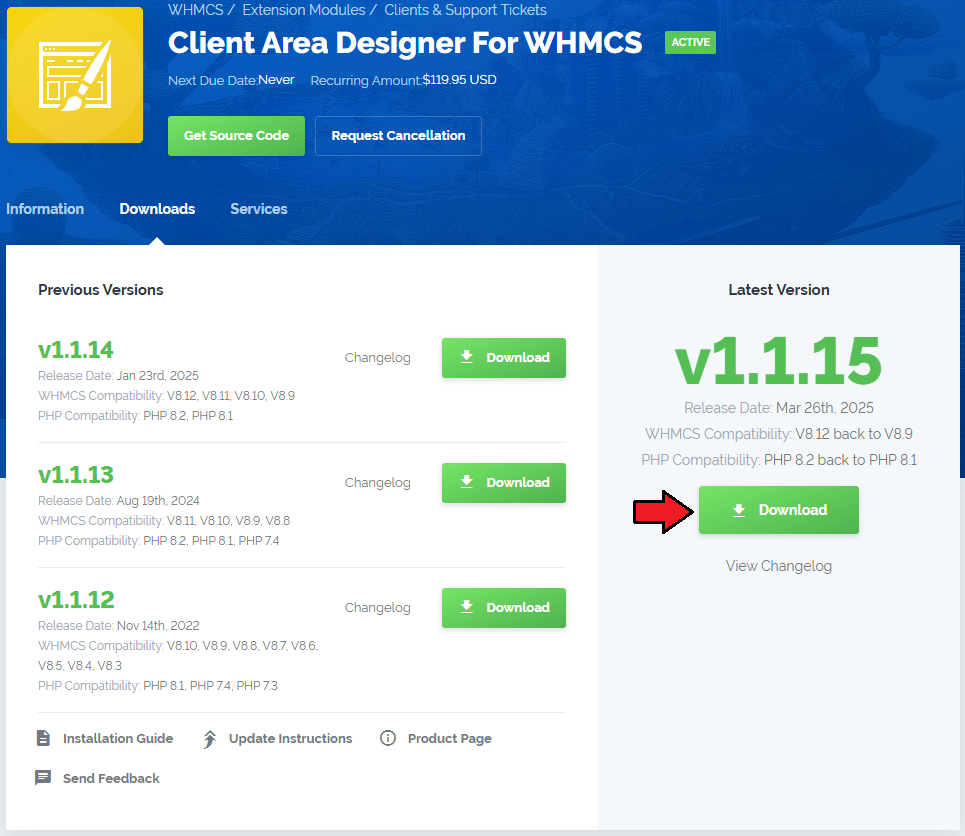
|
| 2. Upload and extract the module into the main WHMCS directory. Files in your WHMCS directory should look like on the following screen. |

|
| 3. When you install Client Area Designer for the first time you have to rename 'license_RENAME.php' file. File is located in 'modules/addons/ClientAreaDesignerModule/license_RENAME.php'. Rename it from 'license_RENAME.php' to 'license.php'. |
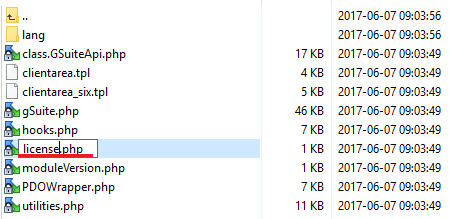
|
| 4. In order to configure your license key, you have to edit the previously renamed 'license.php' file. Enter your license key between quotation marks as presented on the following screen. You can find your license key in your client area → 'My Products'. |

|
| 5. Now you have to activate the module in your WHMCS system. Log in to your WHMCS admin area. Go to 'Setup' → 'Addon Modules'. Afterwards, find 'Client Area Designer' and press 'Activate' button. |
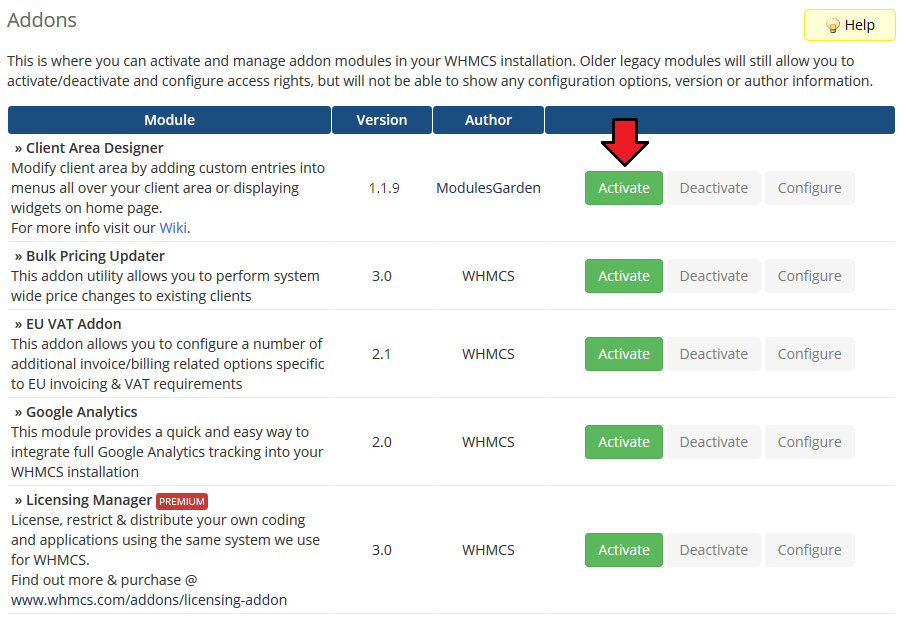
|
| 6. In the next step you need to permit access to this module. To do so, click on 'Configure' button, tick 'Full Administrator' and press 'Save Changes'. |
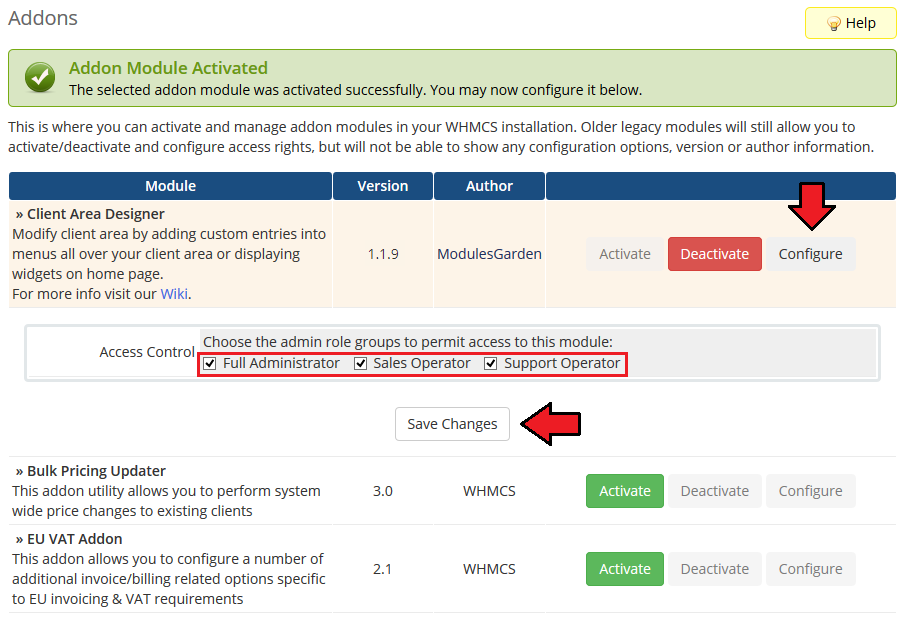
|
| 7. You have just successfully installed Client Area Designer For WHMCS! You can access your module under 'Addons' → 'Client Area Designer'. |
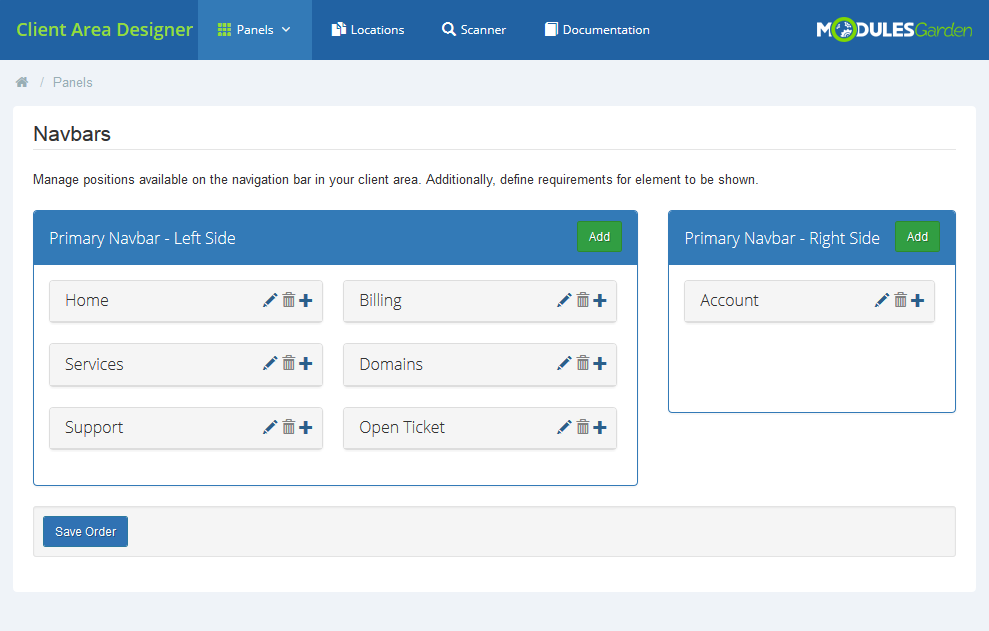
|
Configuration and Management
| Client Area Designer For WHMCS is a module which allows you to adjust the layout of any panels available on your client area as well as add new widgets sections. The module does not require highly advanced configuration. |
Panels
Under 'Panels' tab you will find three sections dedicated to the visibility of different types of panels in your client area.
|
| On the first sight you will see two tables, each related to Primary Navbar Left or Right side. There are already all the predefined sections outlined with their official names and positions. |
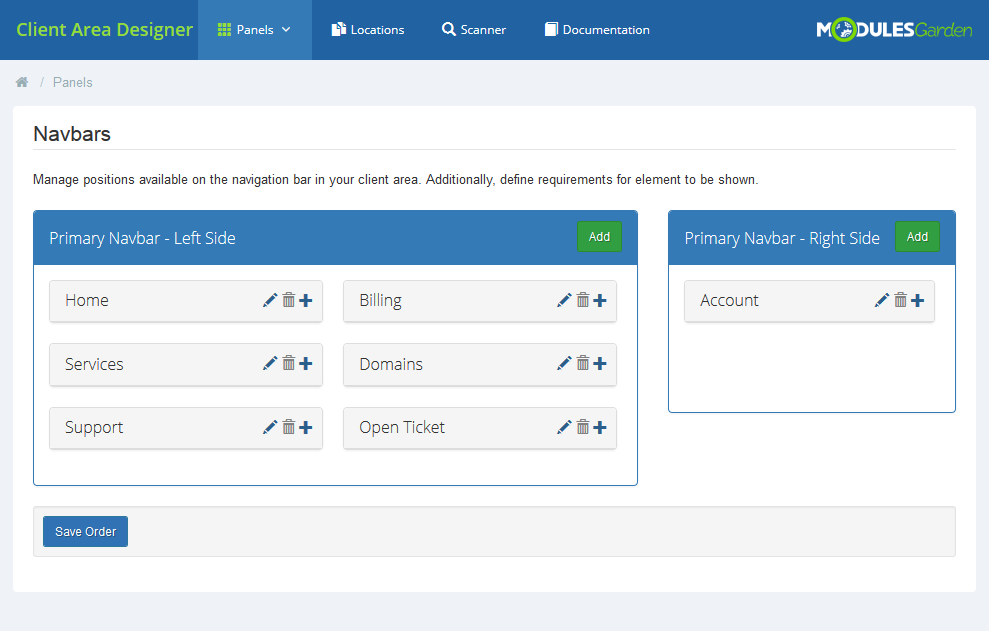
|
| Those are the below navbar panels visible in the client area. |
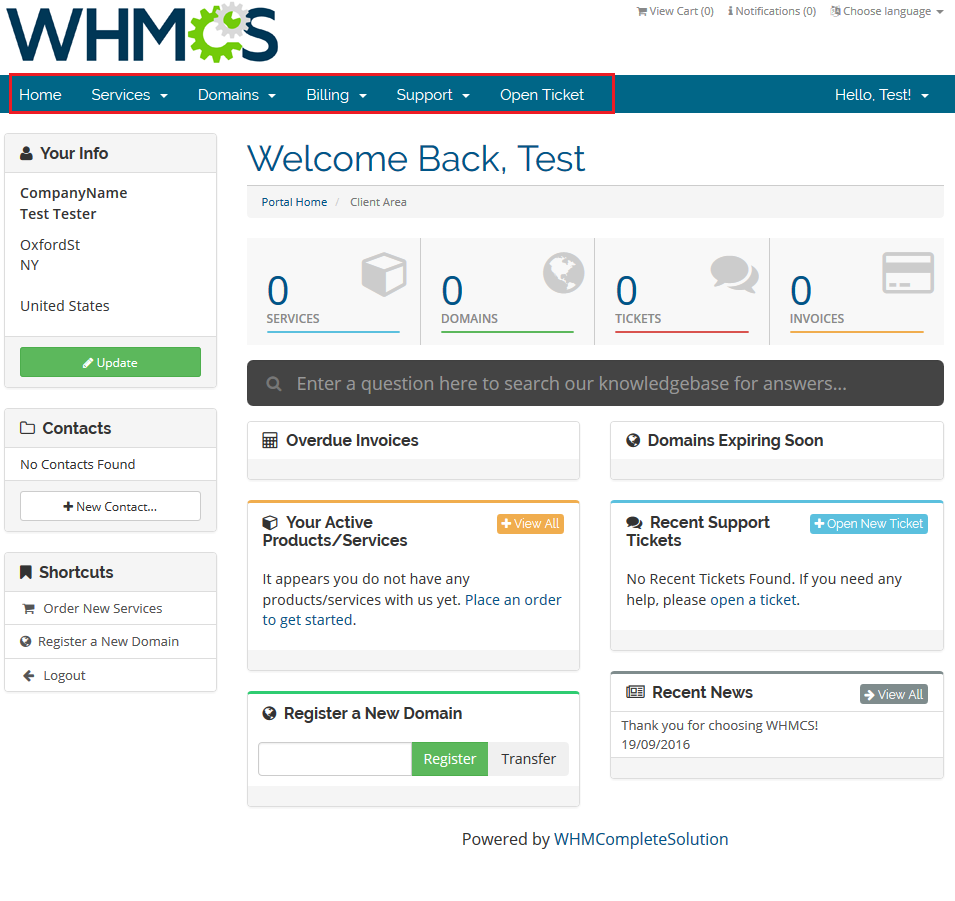
|
| First of all, you may change the position of the elements. Drag one panel and drop it in the required place. |
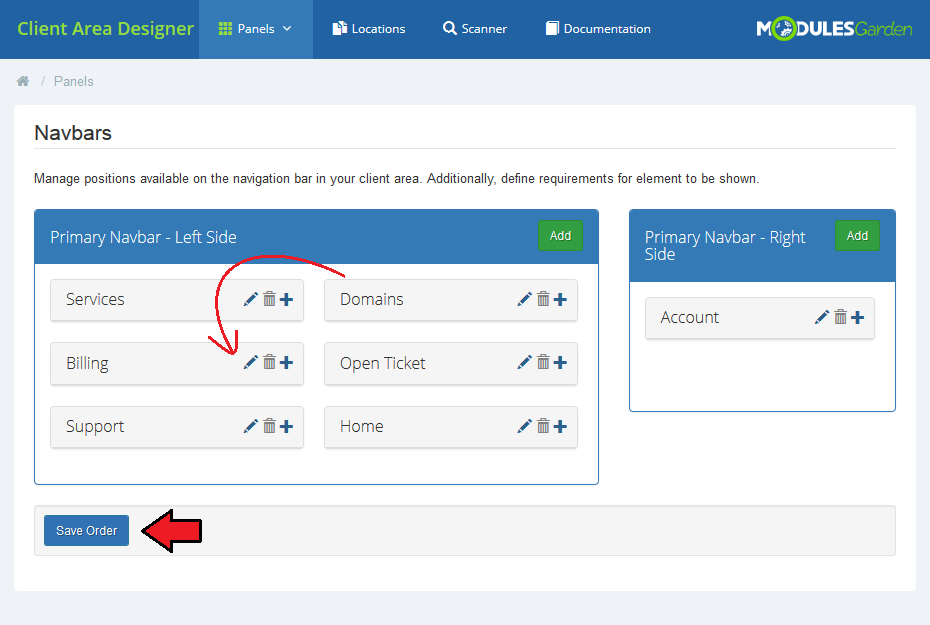
|
Use action buttons to:
|
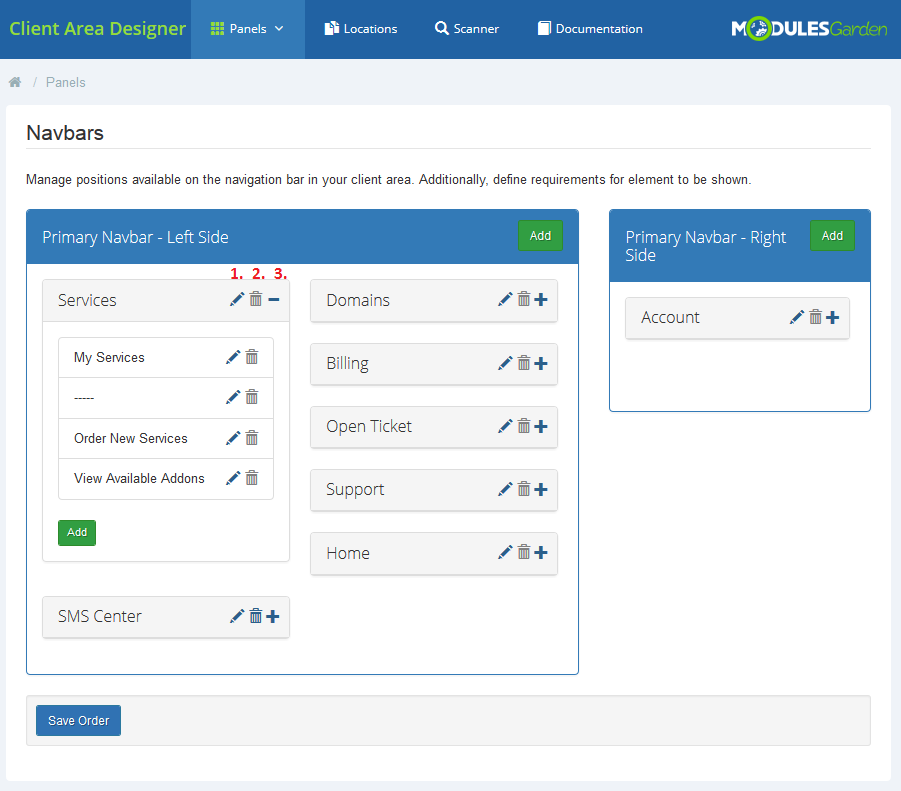
|
Edit Element
When you are editing an existing parent element, you may:
|
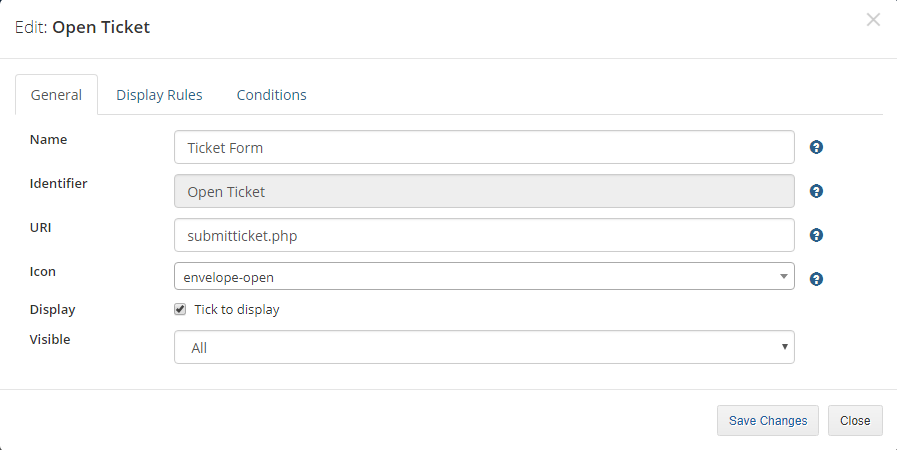
|
| You may also provide some display rules, only clients who fulfill the rules will see the element. If you leave this part empty, the element will be visible for all clients without limitations.
Do not forget to save the changes when ready. |
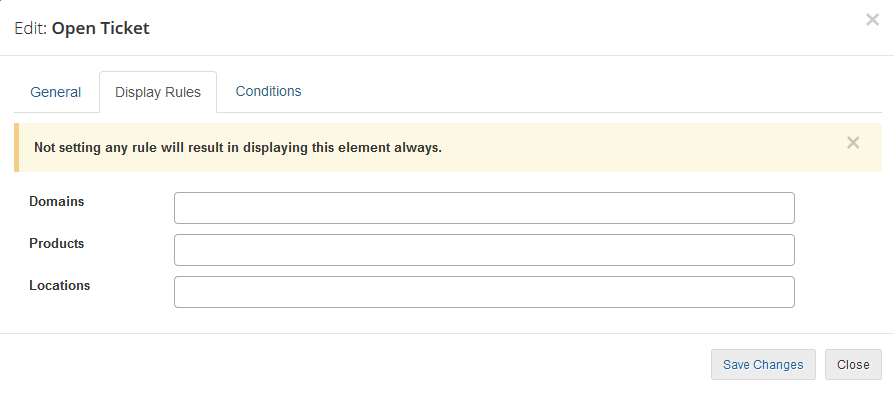
|
New Parent Elements
| It is possible add a completely new parent element either on left or right side. Press 'Add'. |
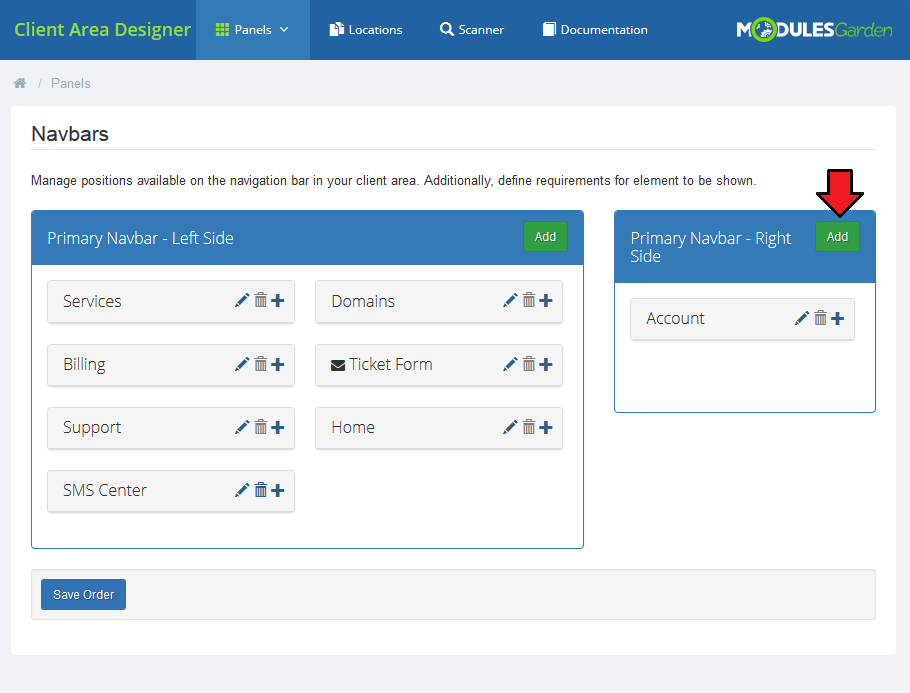
|
| Then you will have to fill out all the general info, content and display rules. Start with 'General'. Provide:
|
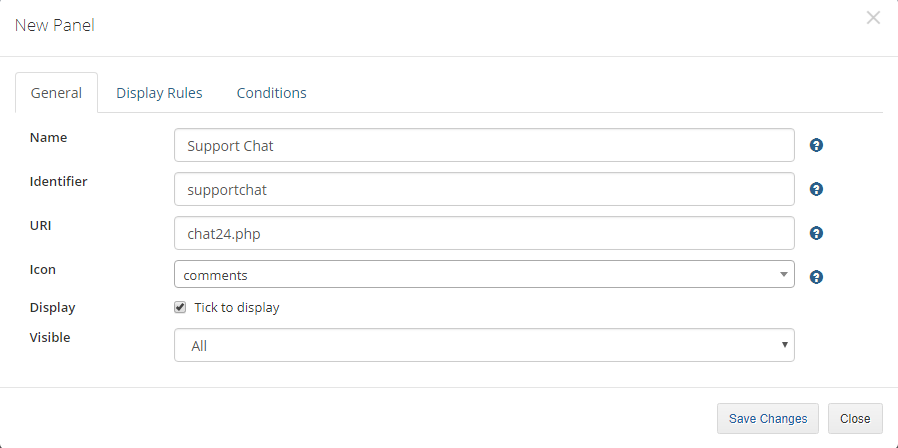
|
| If you want only some of the clients to see the panel, then set up the 'Display Rules'. In our case we have decided to select products a client must own to get access to 'Support Chat'. |
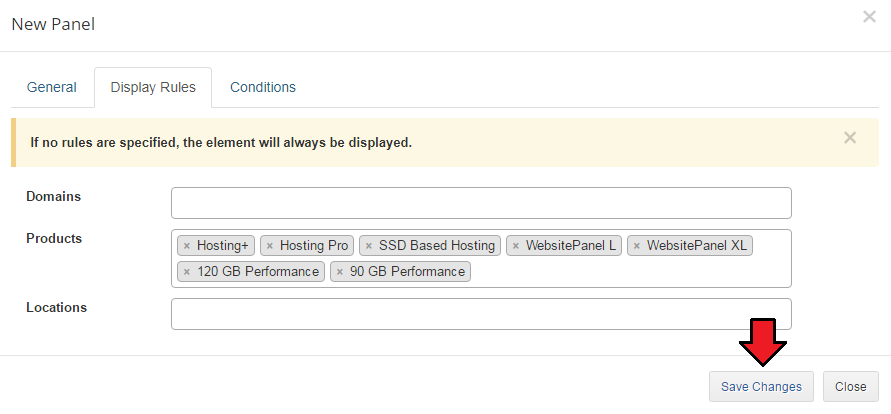
|
| This is how our new panel looks like in the client area: |
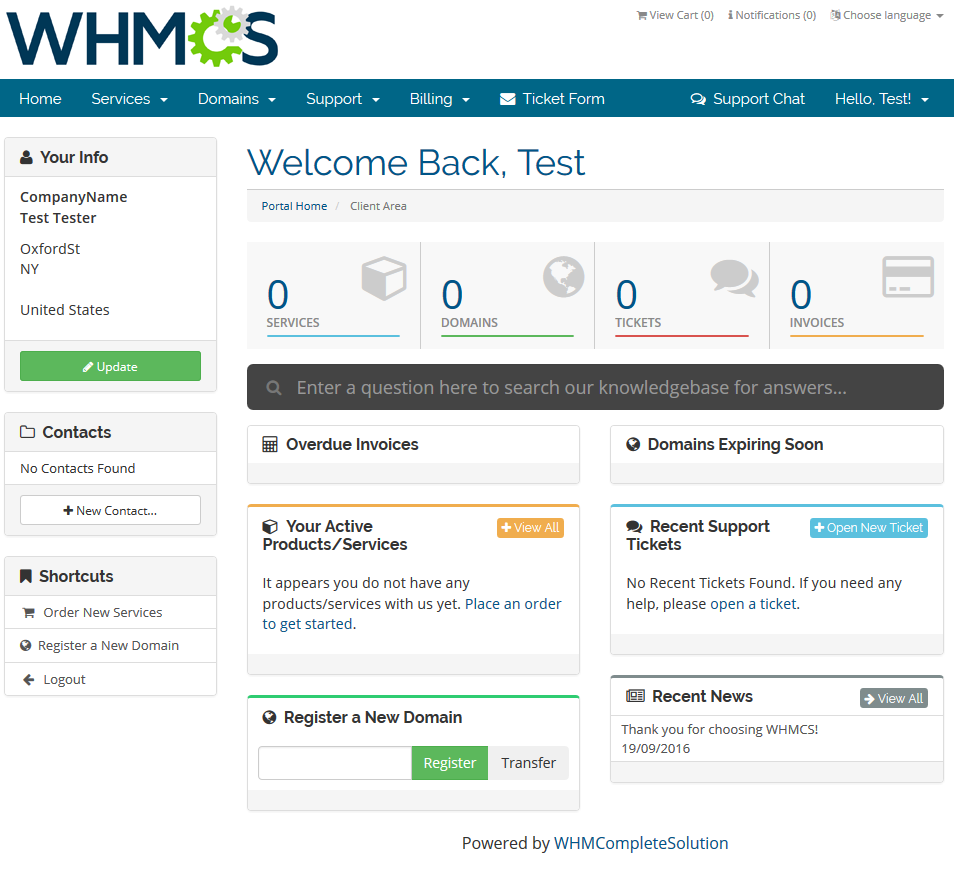
|
New Child Element
| Let's now add one more element to the already existing 'Support' panel. |
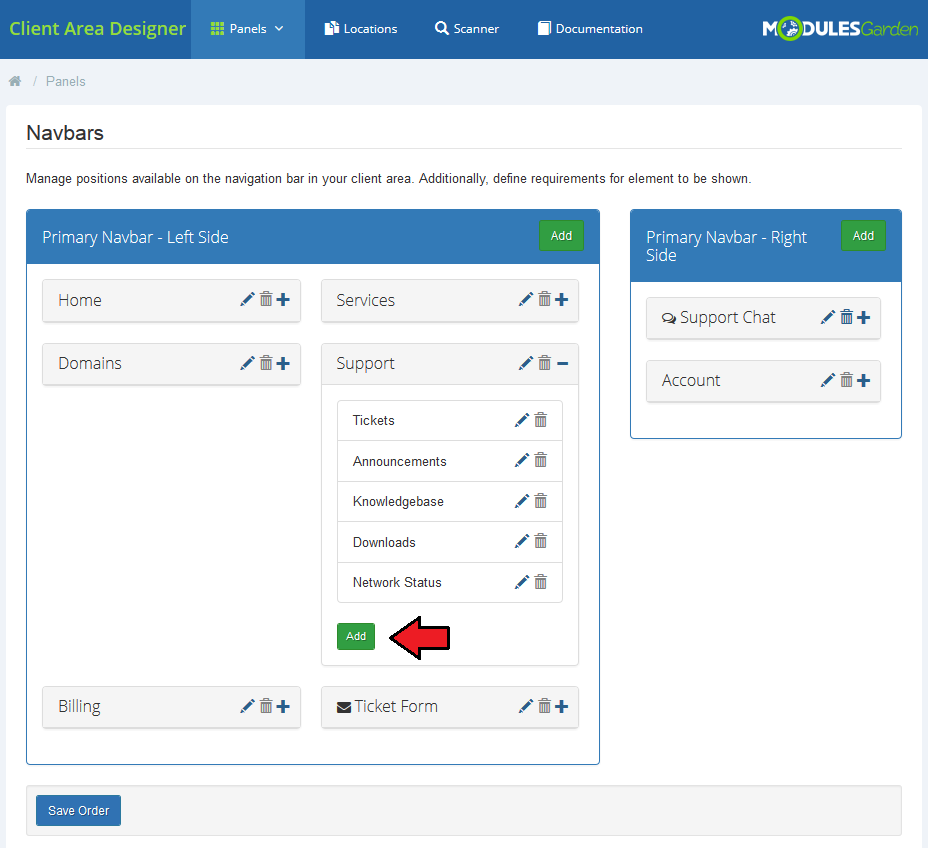
|
You have to fill out the same data as in case of parent element:
This time we want all the clients to have access to our FAQ site, so we do no set any 'Display Rules'. |
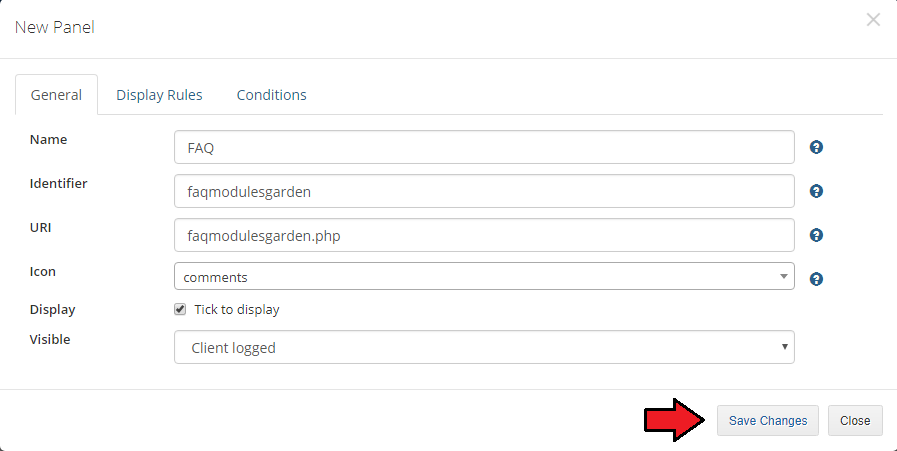
|
| As a custom element, you may delete it completely or edit. |
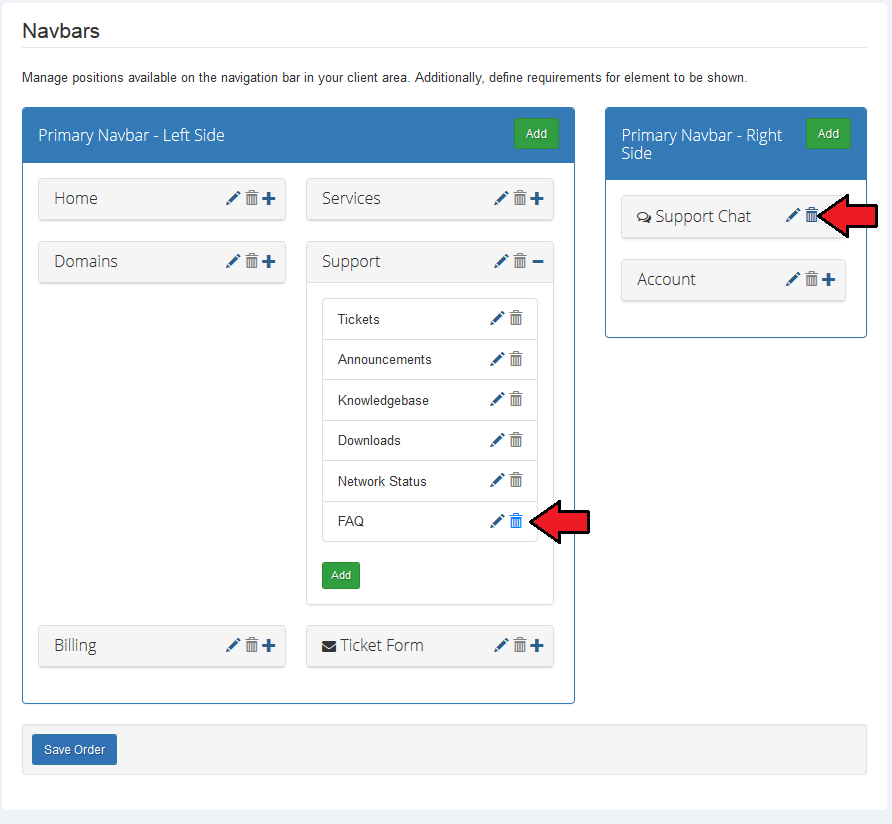
|
| Let's take a look at the new position in the client area: |
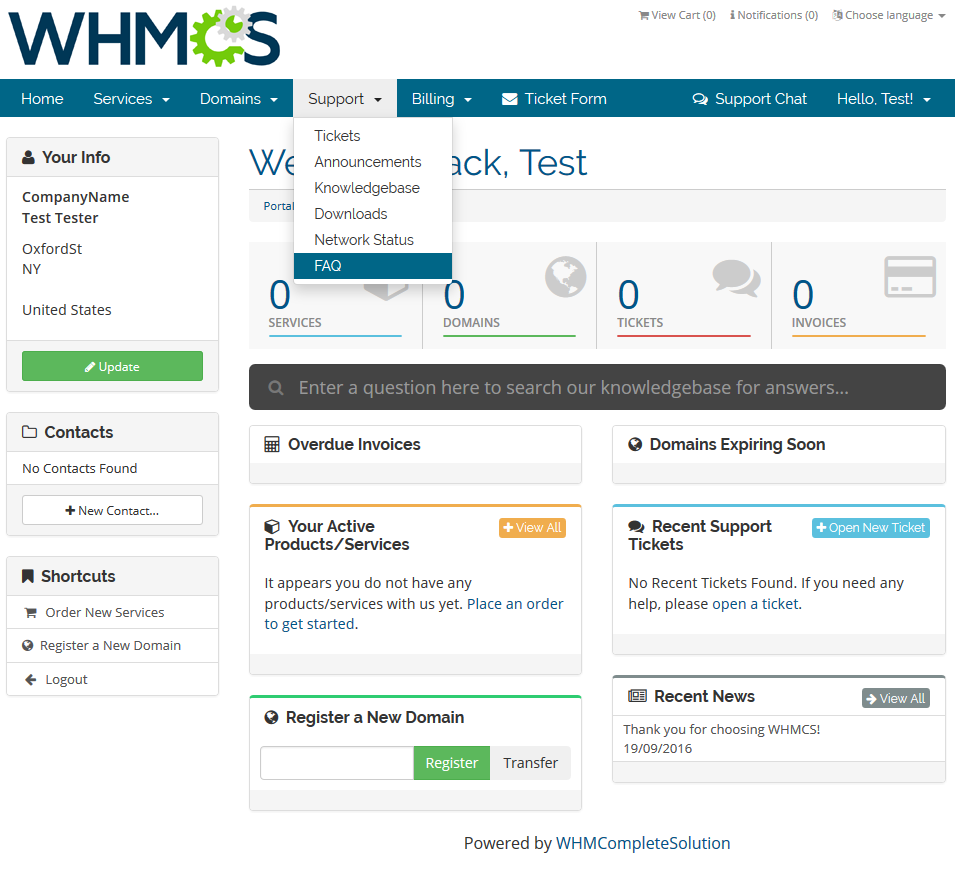
|
Sidebar Panels
| Sidebar panels section refers to the elements located on the left side of your client area. Generally, management of sidebars is very similar to the Navbar panels described in the previous section. |
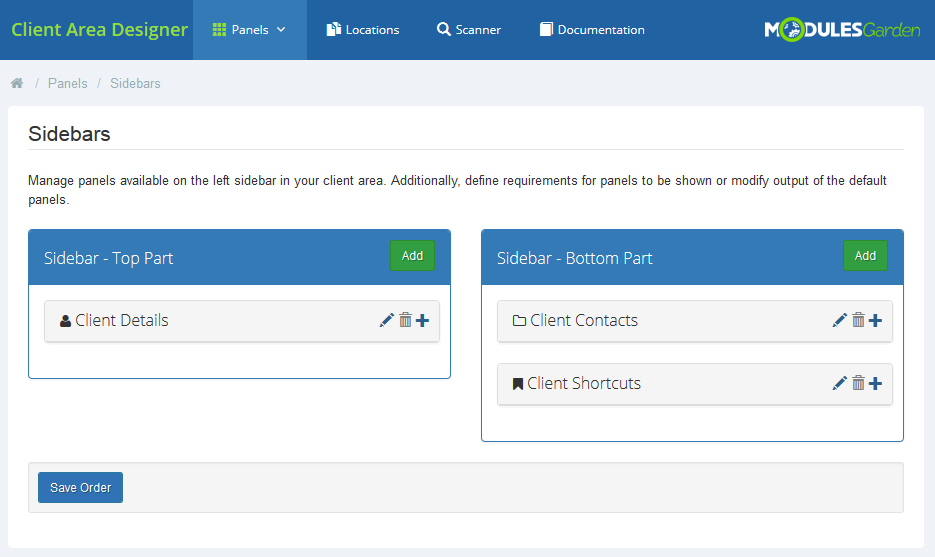
|
Available actions:
|
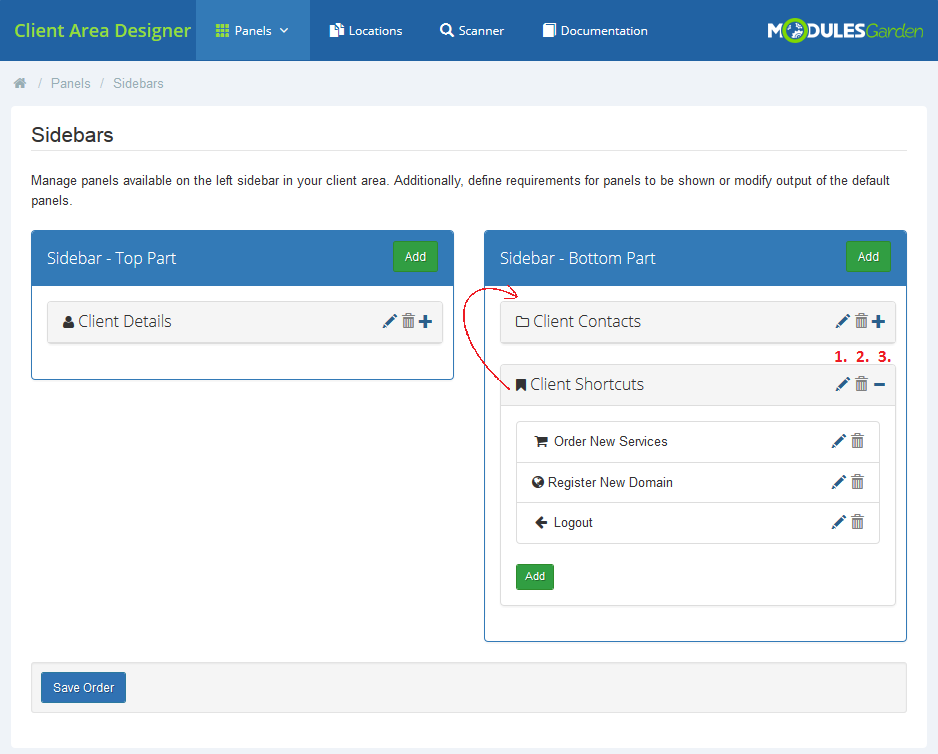
|
Edit Element
General section:
|
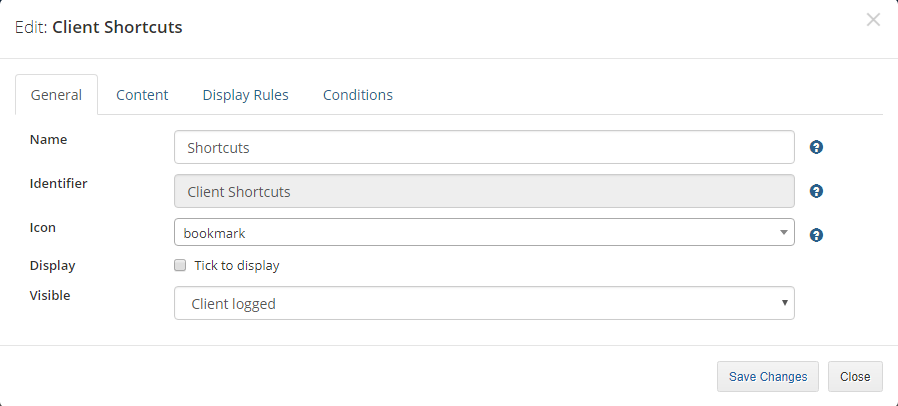
|
Content:
Note that it is possible only if the element has no child elements. |
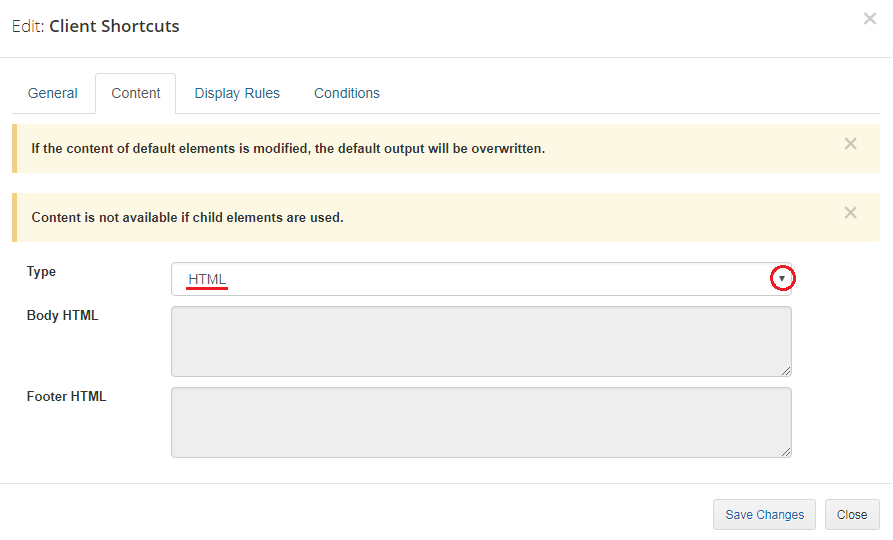
|
| Display rules - only clients who fulfill the rules will see the element. If you leave this part empty, the element will be visible for all clients without limitations. Do not forget to save the changes when ready. |
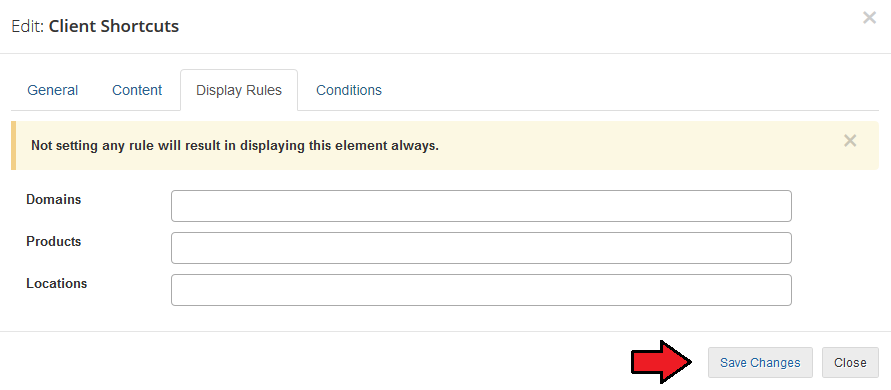
|
New Parent Elements
| You may add a completely new parent element either on left or right side. Press 'Add'. |
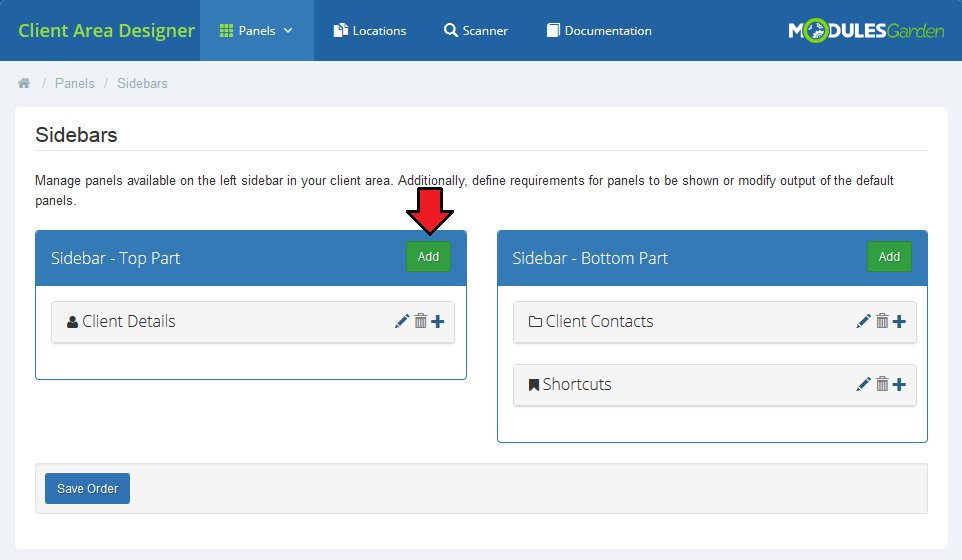
|
| Then you will have to fill out all the general info, content and display rules. Start with 'General'. Provide:
|
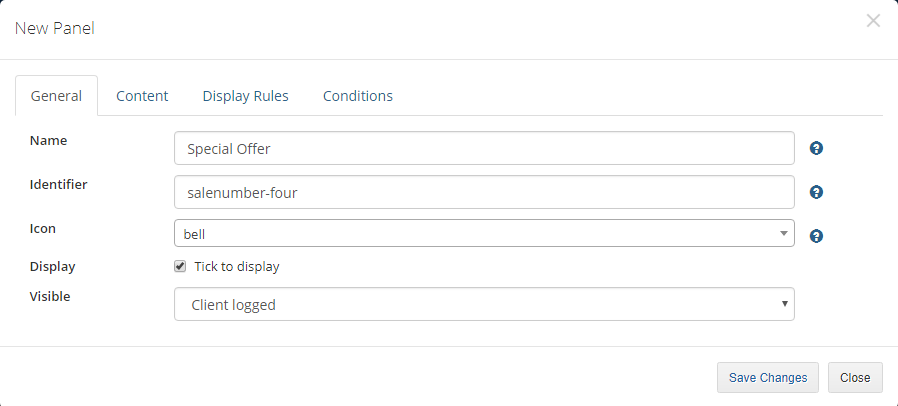
|
| Define Body and Footer content. Note that if you provide the content here, you will not be able to add child elements to this item. |
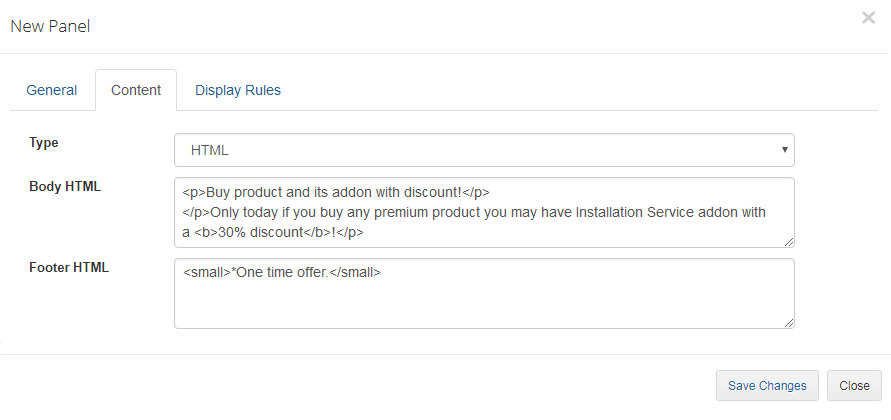
|
| If you want only some of the clients to see the panel, then set up the 'Display Rules'. Save the changes in the end. |
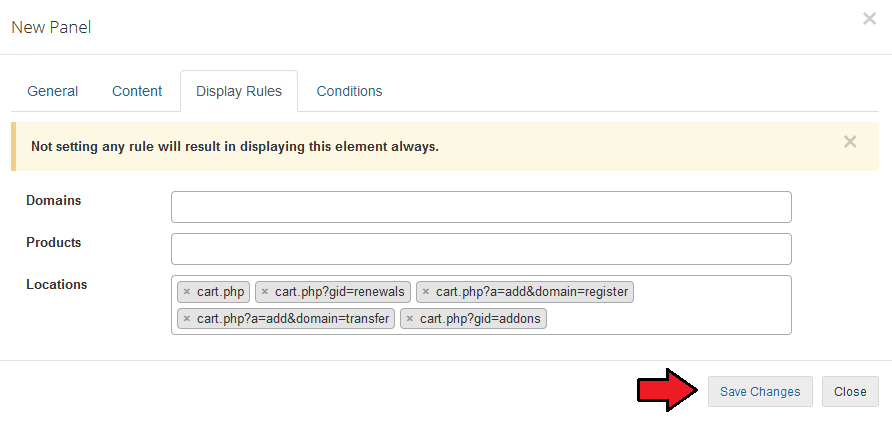
|
| This is how our new panel looks like in the client area: |
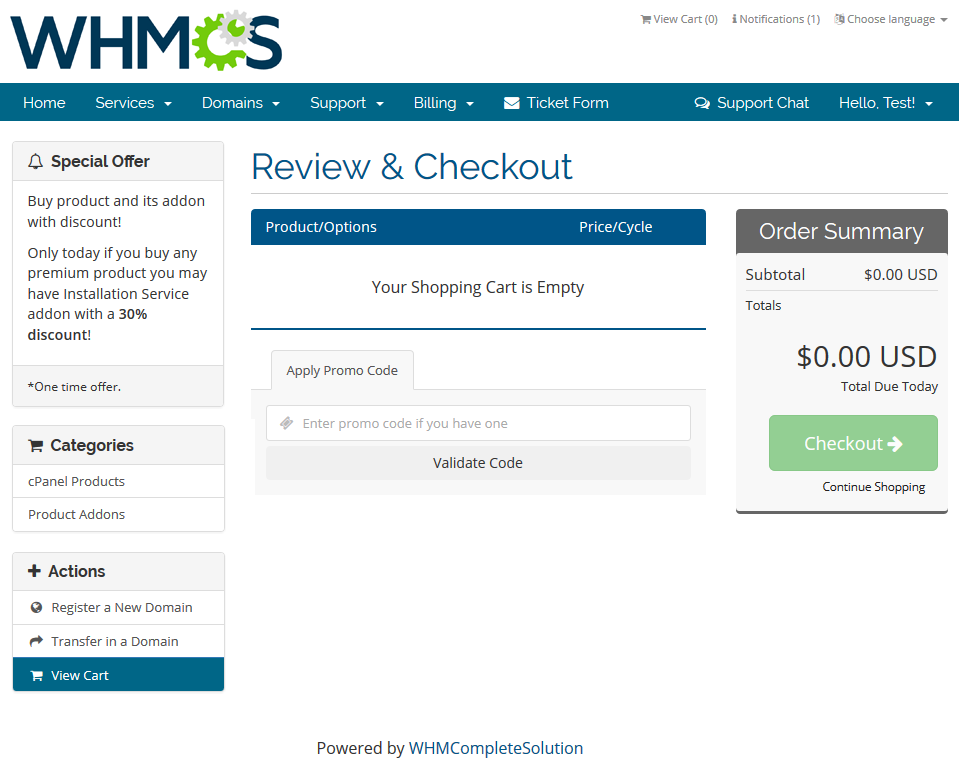
|
New Child Element
| Let's now add one child element to client's 'Shortcuts'. |
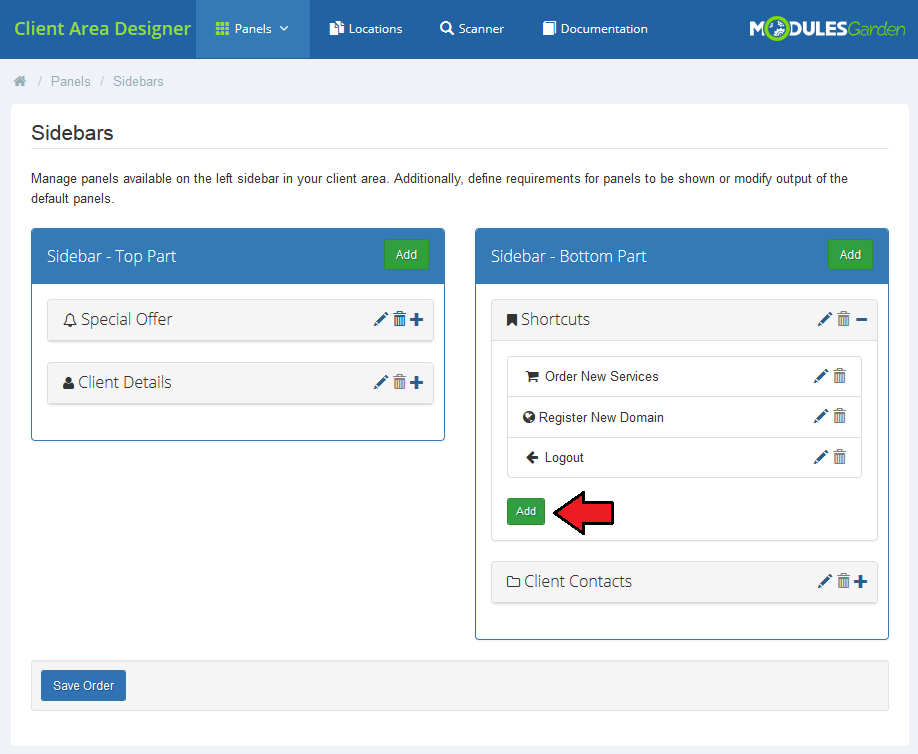
|
Fill out all the required data to crate a correct link:
|
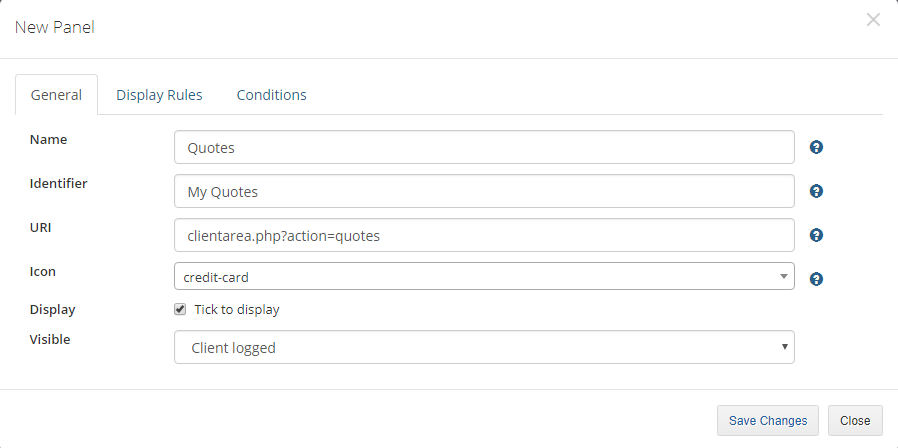
|
| As it is a custom element, you may delete it completely or edit. |
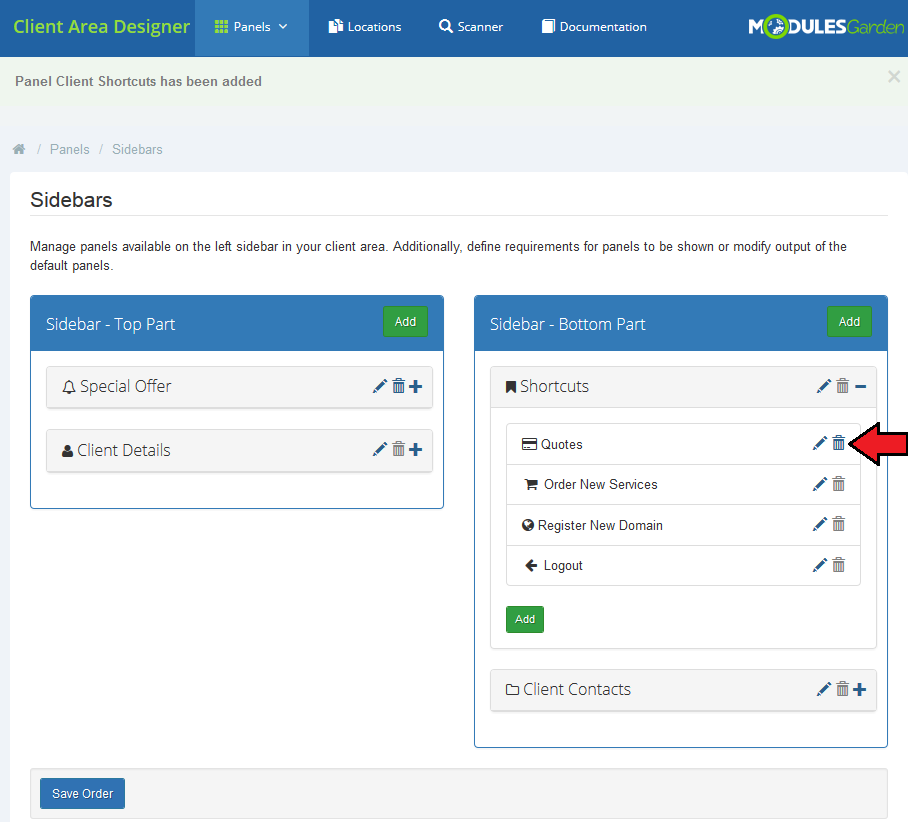
|
| Now, you see an additional link under 'Shortcuts'. |
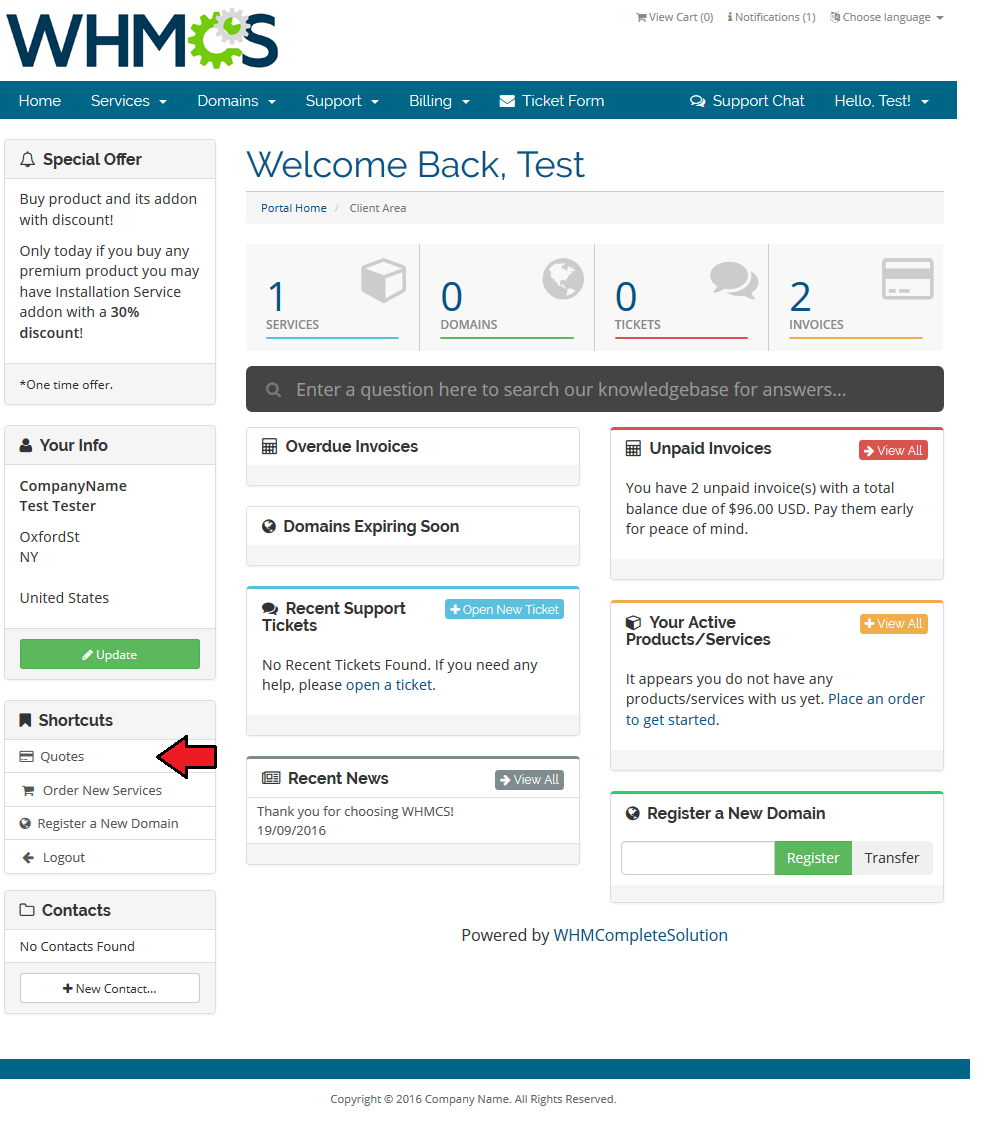
|
Homepage Widgets
| The last type of panels are homepage widgets. Available actions:
|
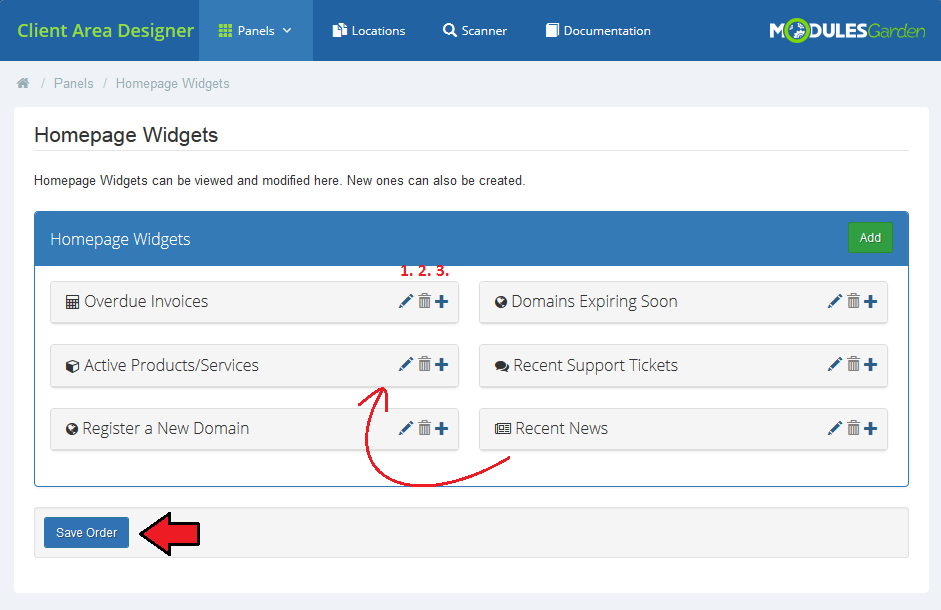
|
| To visualize, these are the client area widgets we are going to alter in a moment: |
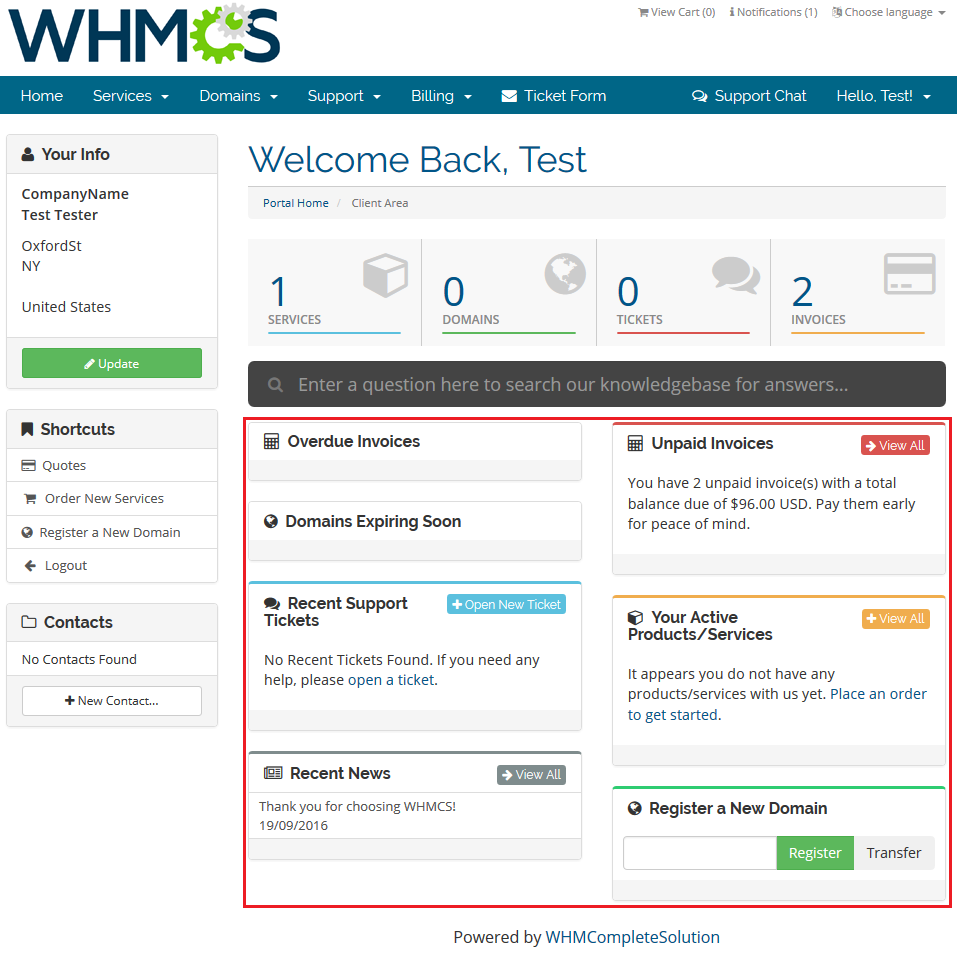
|
Edit widget
General:
|
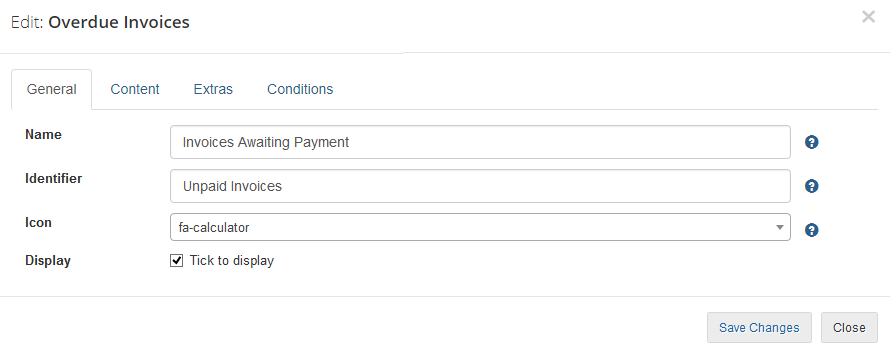
|
| Under 'Content' section you can overwrite the default text. We will leave it empty as we do not want to change the content, just the look and feel of the widget. |
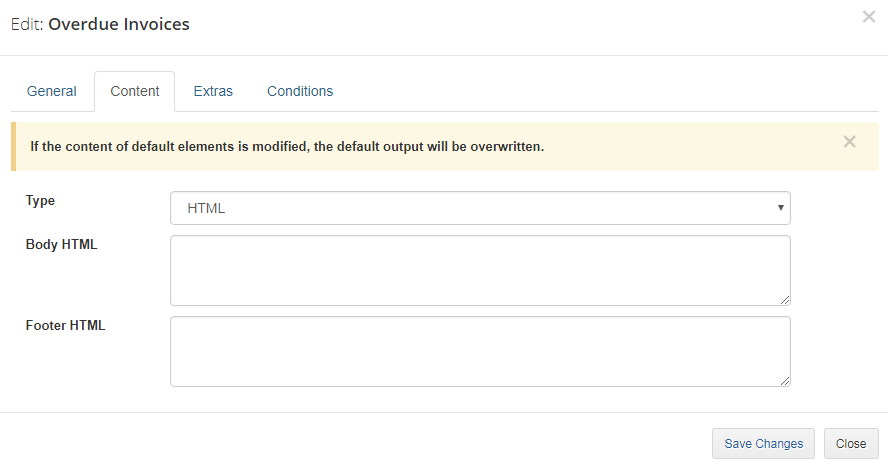
|
Extras - here you can change the visual parts:
|
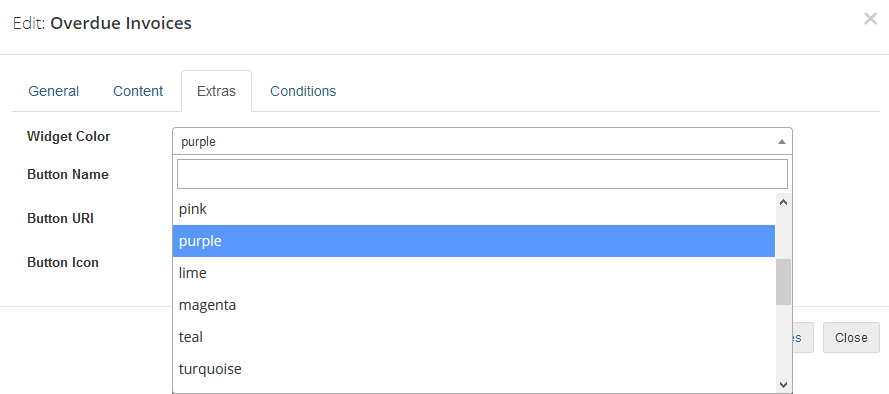
|
| That is how our adjusted widget looks like now: |
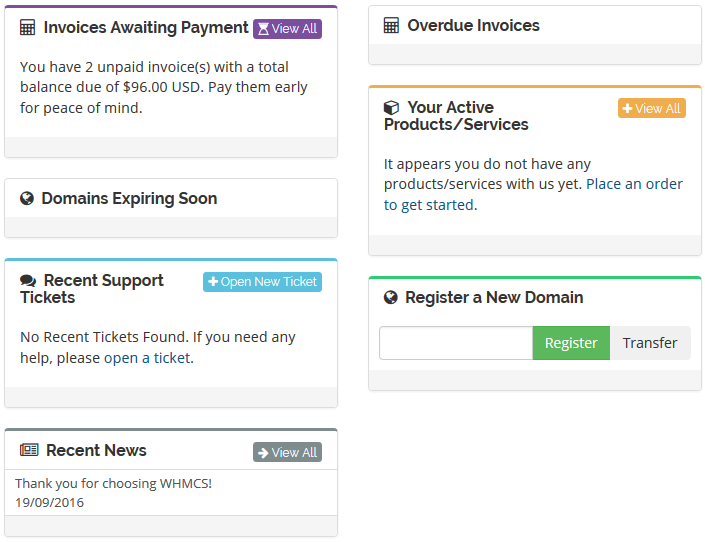
|
Add New Widget
| For presentation purposes we will create now a completely new widget. It will include a button redirection to our Knowledgebase and two links to FAQ and Upload Files form. To start, simply press 'Add' button. |
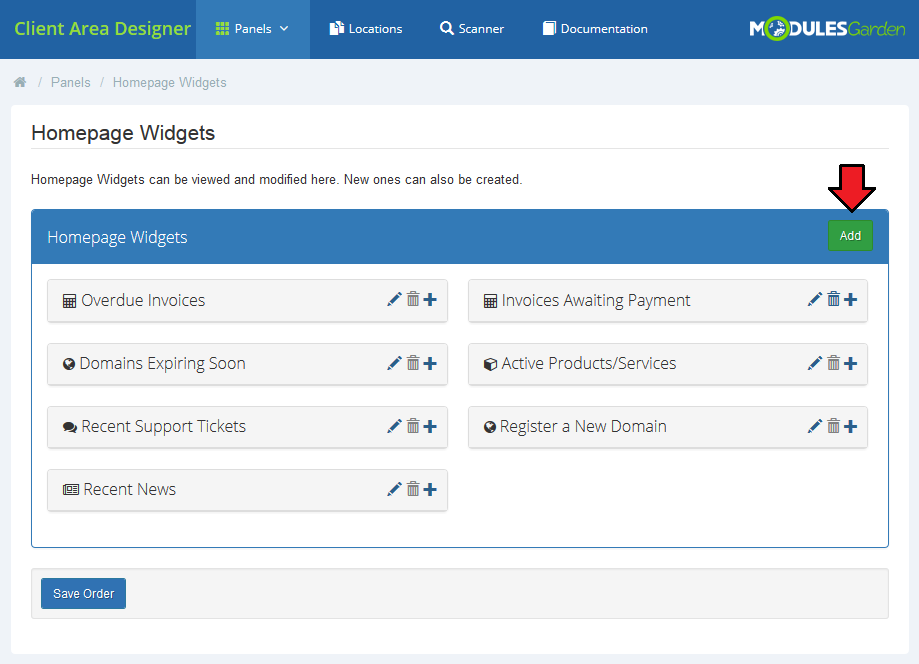
|
| Then fill out all the general info, content and extras. Start with 'General', provide:
|
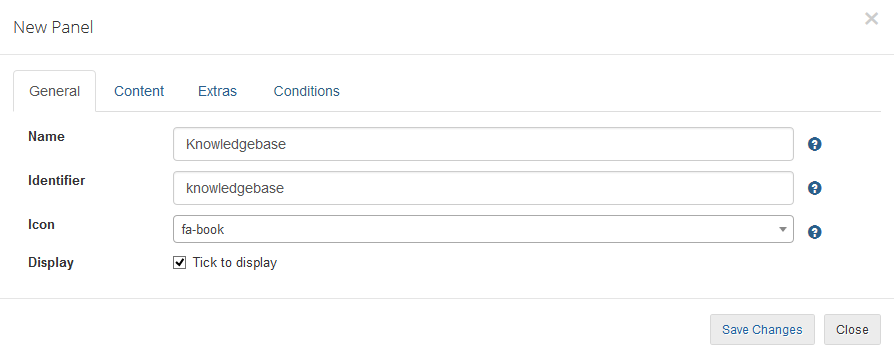
|
| As we are going to add two links inside the widget, we will skip this section. |
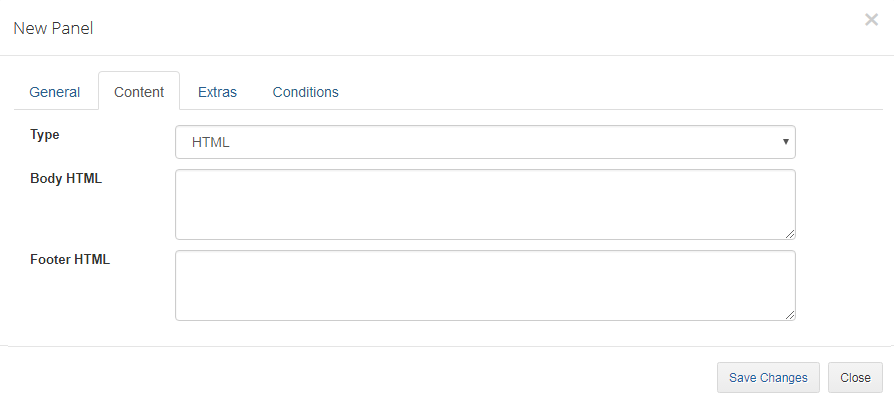
|
| Finally, customize your widget by defining color and button details.
Save the changes in the end. |
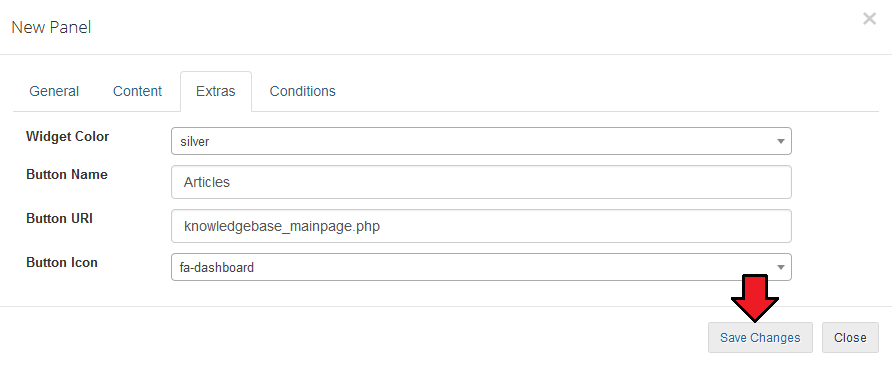
|
New Child Widget
| Let's now add one child element to the just created 'Knowledgebase'. |
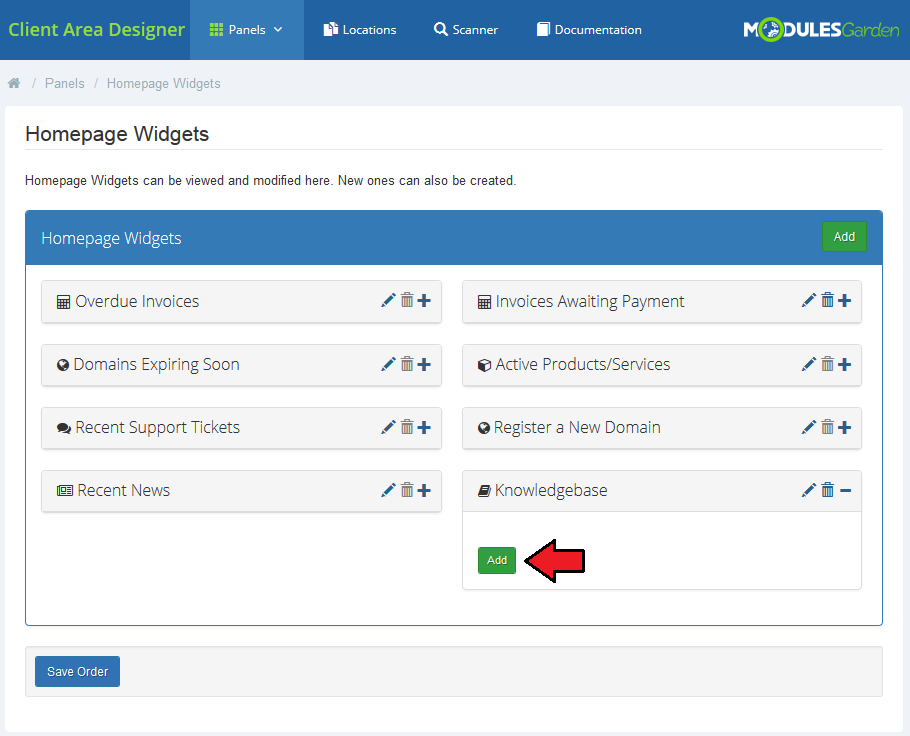
|
Fill out the required data:
|
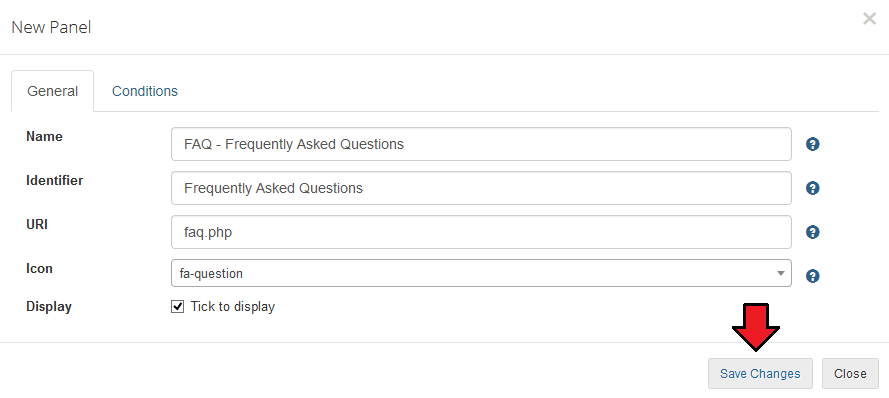
|
| As you can see, we added two new entries under 'Knowledgebase' widget. surely you can edit each one of them or delete. |
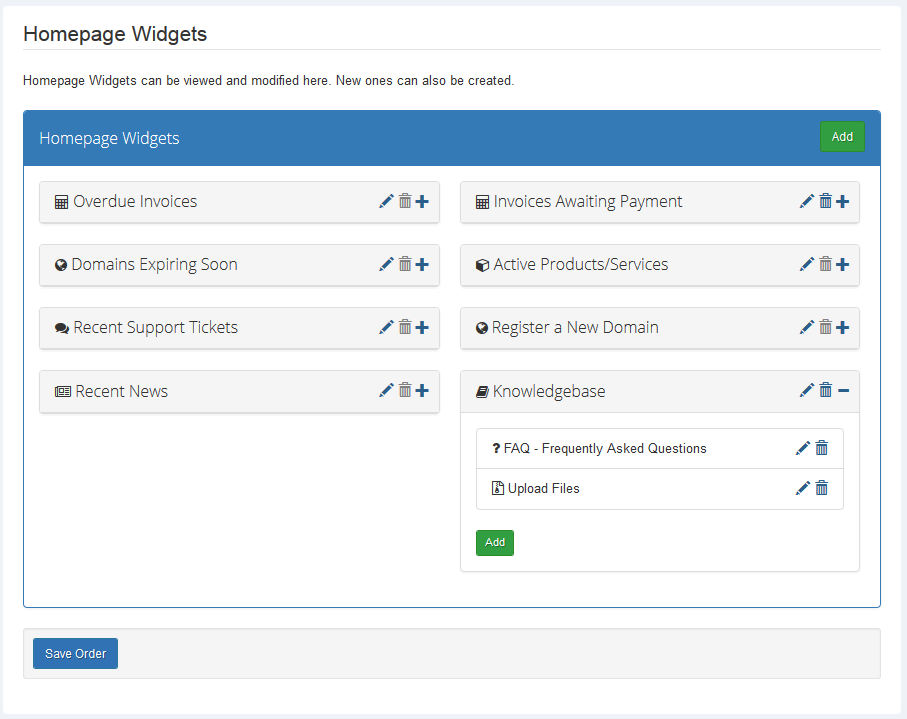
|
| Here is a final view of our customized client area with new elements: |
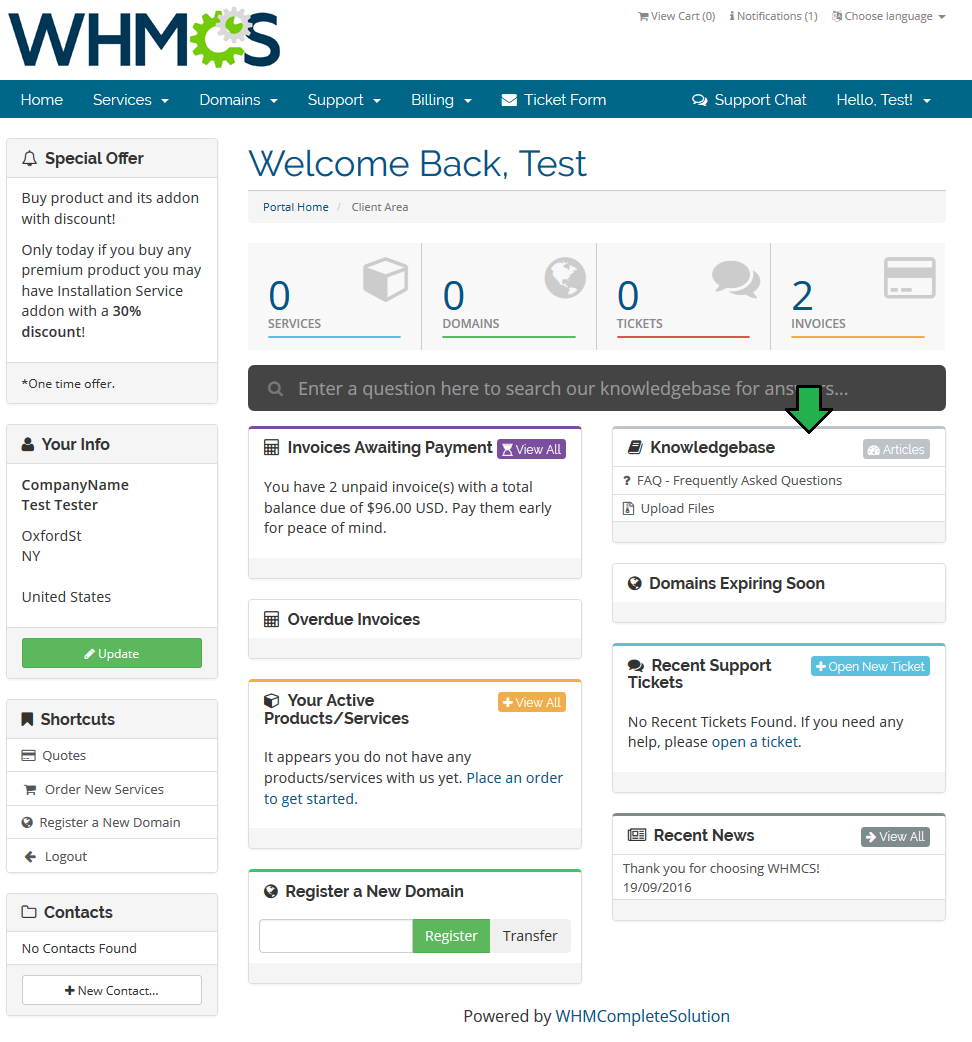
|
Locations
| In this you will find an extended list of all standard locations in your client area with its common name and URI. These locations are searched through by the module scanner in search of custom panels and are available in 'Locations' field when setting up 'Display Rules'. |
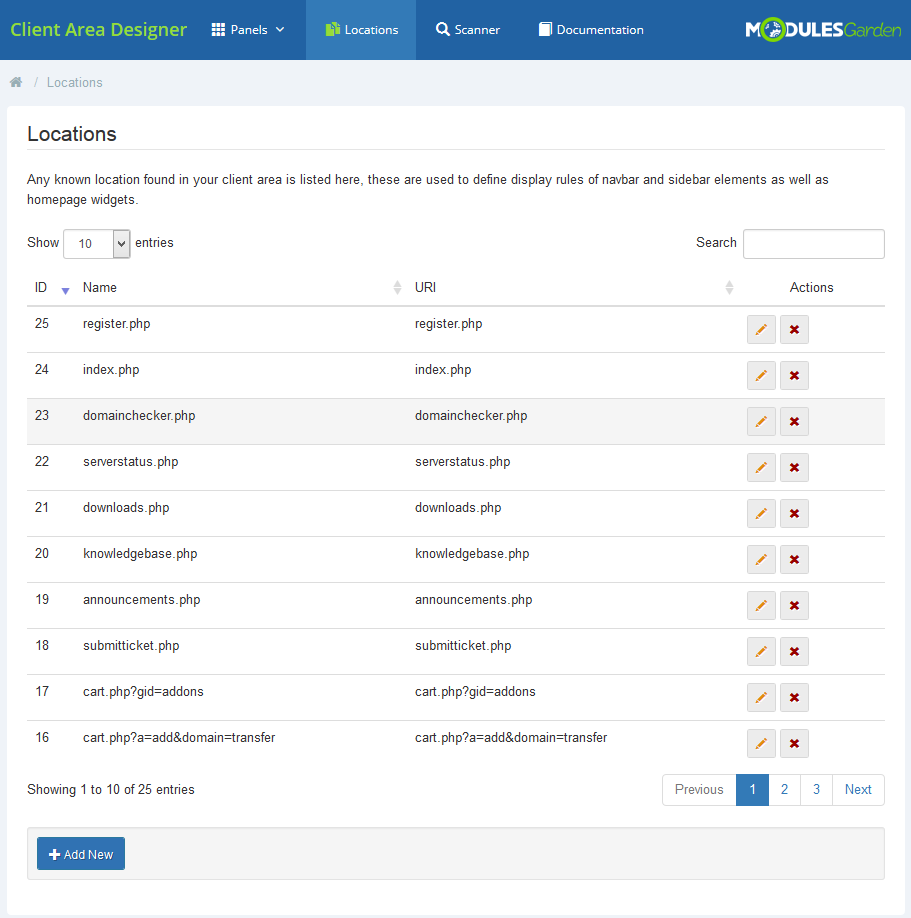
|
| Press button with pencil icon next to location you are interested in to edit it. |
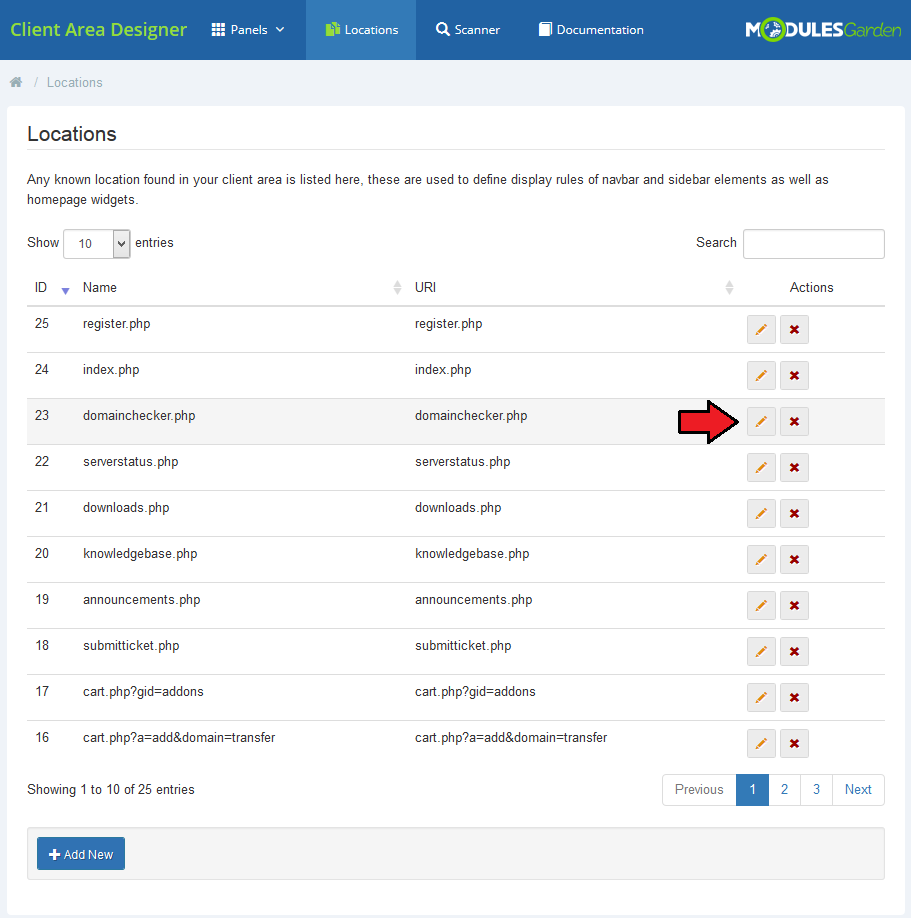
|
| There you can edit the name of existing location and its URI. |

|
New Location
| You may also add new if you have some custom locations and you wish to use them in our module. Please note that your locations must be manageable by WHMCS. |
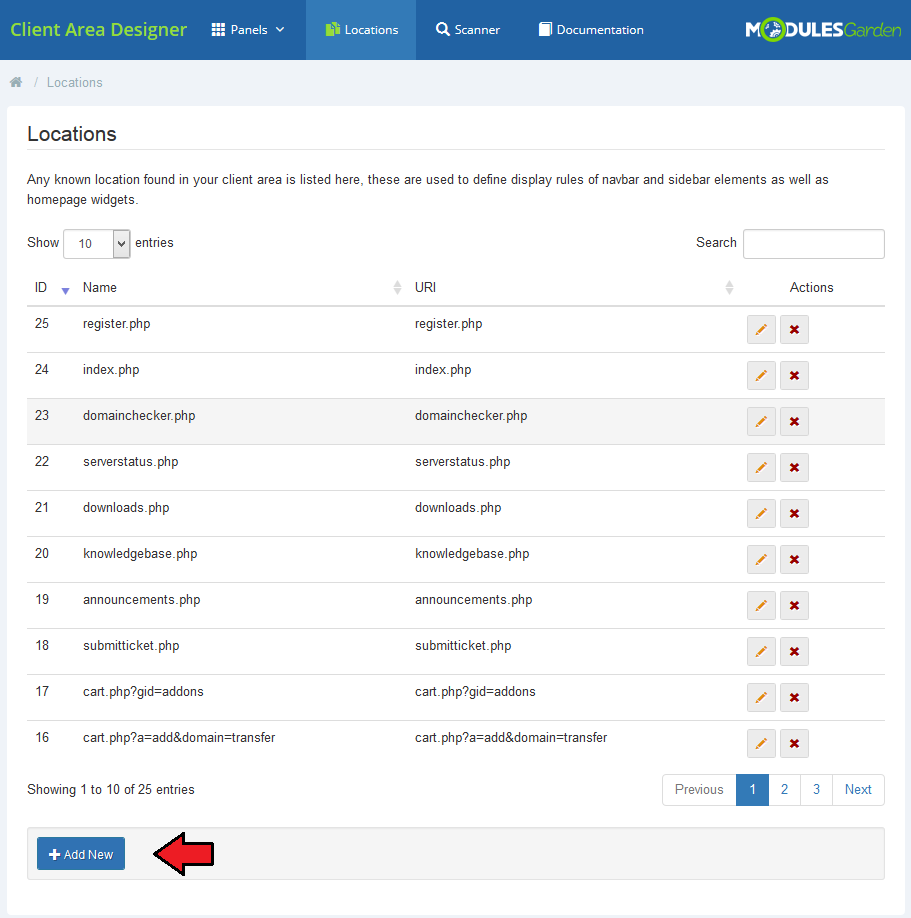
|
| Provide location name and URI. When ready, your new location will be from now on used by Client Area Designer module. |

|
Scanner
| Scanner is a tool that allows our module to carefully browse through a chosen client's client area in search of any elements in known locations. Select a client to log in as one and run the scanner. |
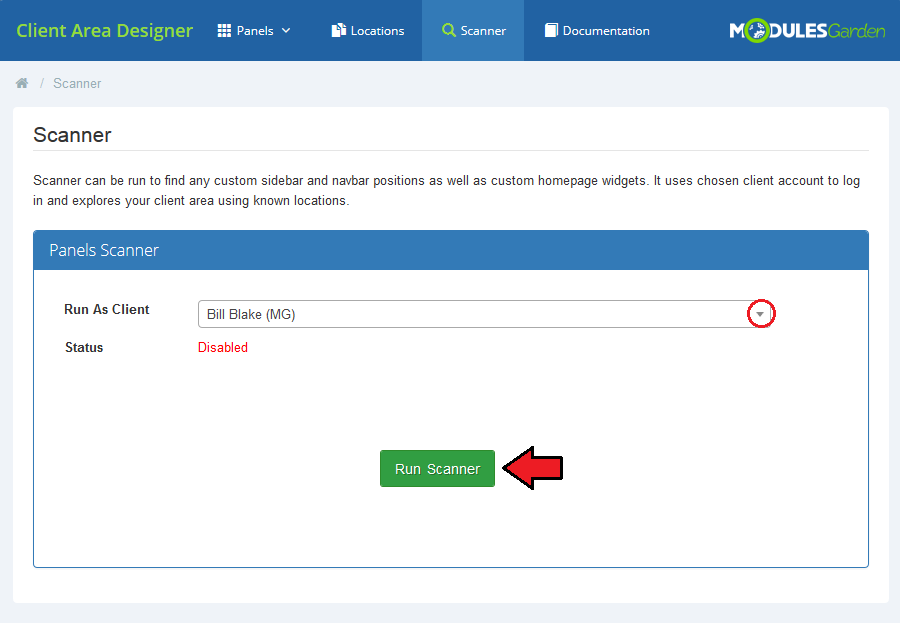
|
| You will see a preview of all locations. When the scan is finished, you will see a summary with the number of found panels. All newly found elements will be automatically added to proper positions in the addon. |
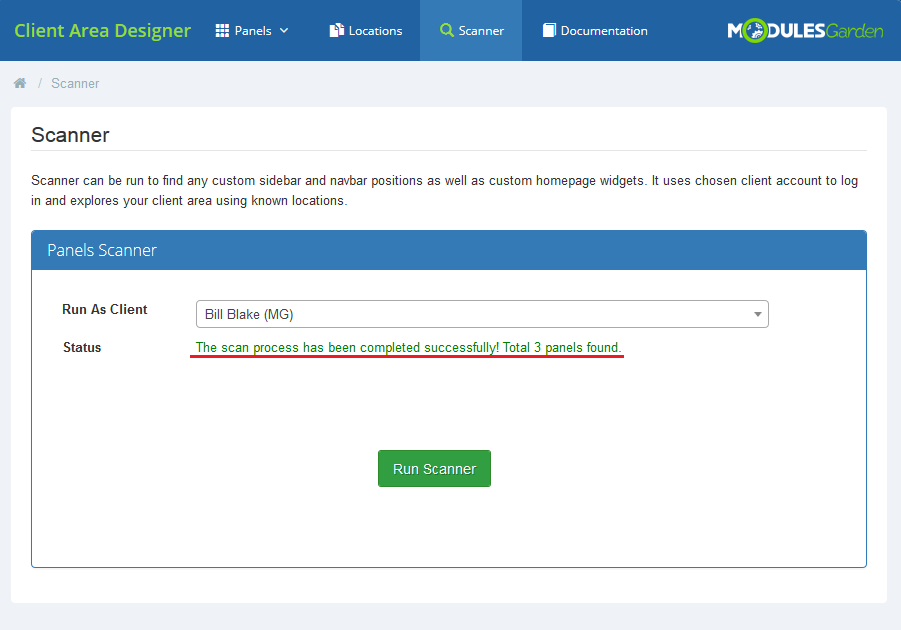
|
Documentation
| The last position in your navigation menu, when pressed, redirects to the article you are currently reading. |
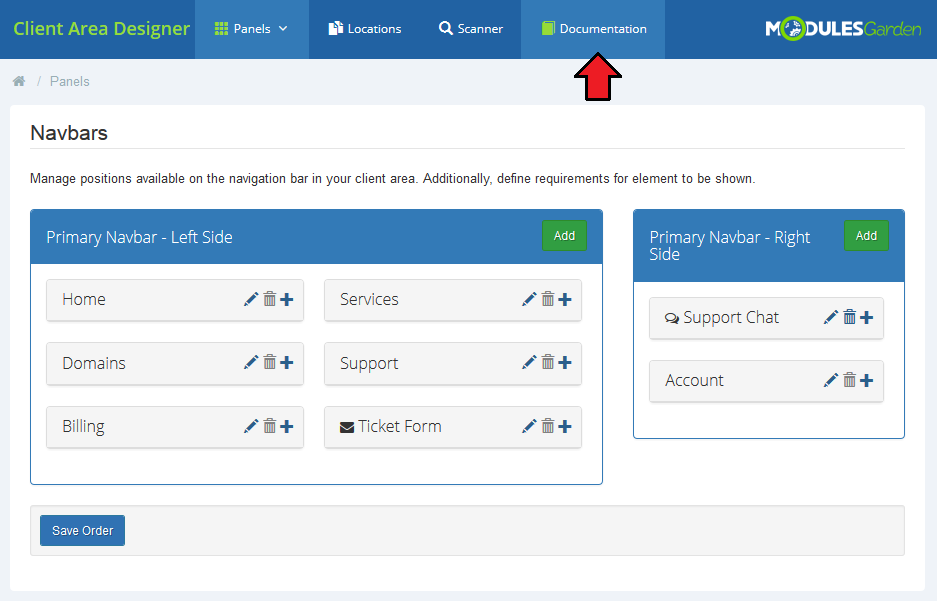
|
Tips
| 1. When you area adding new element into your client area, you may add the langs used in the lang file to allow translations and changes. To do so:
$_LANG['element name'] = 'Element Name';
|
Common Problems
| 1. When you have problems with connection, check whether your SELinux or firewall does not block ports. |